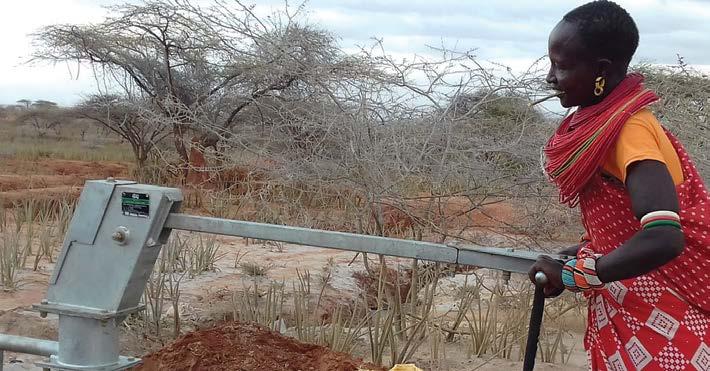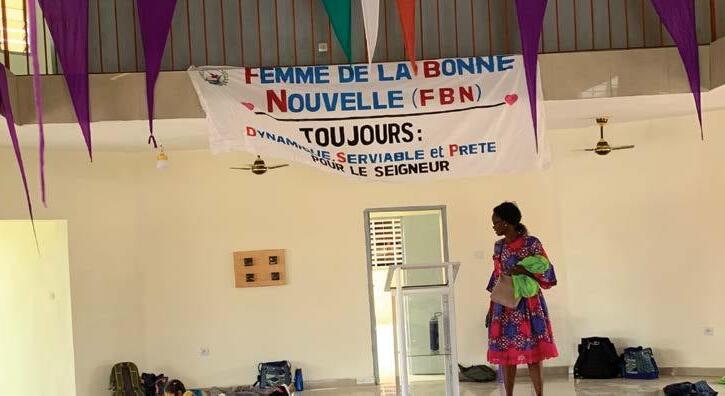
Rightsizing Life
The Psychological Advantages of Saving
Life Stewardship
Fried Bologna and the WMO
Faith in a Dry and Dusty Land
Reflections on the Purposes of Marriage
Facing Facts








Rightsizing Life
The Psychological Advantages of Saving
Life Stewardship
Fried Bologna and the WMO
Faith in a Dry and Dusty Land
Reflections on the Purposes of Marriage
Facing Facts






BY ERIC K. THOMSEN
The stained and worn burlap sack caught my eye. Tucked into a cracked and rusty galvanized bucket filled with old pipe fittings, assorted electrical parts, and other random odds and ends, the texture seemed strangely out of place. Pulling the bag gently from its resting place, I smiled to see a weathered “Marble King” logo on the side. Glancing across the table, I held up the bag and casually asked, “How much?”
The elderly farmer hosting the barn sale looked up from his paper, peered over the top of his glasses, and replied, “How ‘bout two bucks?”
Sold!

I happily handed over two bills and headed home with my treasure. Since my late father was a lifelong marble player and collector, old marbles now hold special significance to me.
Arriving home, I gingerly opened the sack, careful not to tear the fragile burlap. My eyes lit once again as I drew out treasure after treasure: agates, clays, stones, and “steelies” mixed with a more typical array of cat’s eyes, swirls, and uranium glow-in-the dark marbles. As I cleaned and polished each marble, I even discovered a handful of single-pontil, end-of-day, and end-of-cane marbles. (Non-marble-loving readers can Google them. They’re beautiful!)
Treasure indeed.
I sighed contentedly as I retrieved the last marble from the sack. “What a great find,” I thought. As I dropped the now empty sack onto my desk, I heard a faint metallic clink. Peering inside, I saw several small items resting at the bottom. Gently, I shook them out: a tarnished set of cufflinks, a bent and twisted pendant, and another, smaller object.
A bit of polishing and the cufflinks took on the beautiful glow of old gold. Set with sapphires, they were designed by a well-known New York jeweler during the Art Deco period. The pendant, though damaged, was also pure gold. But the “other” object was the real treasure. A diamond! Flawless, colorless, brilliant, and nearly a full carat cut into the antique European style. Perfect timing for an upcoming anniversary!
As I thought about that beautiful stone hidden among dusty marbles, I couldn’t help but wonder how many decades it remained hidden. I recalled the Sermon on the Mount where Jesus urged His followers not to hide their faith but rather to let their lives shine, sparkling and shining as light to a dark, desperate world, a city on a hill that cannot be hid (Matthew 5:12-16).
Hidden faith is like a diamond in a bag of old marbles: out of place and completely useless. Our faith is a treasure the lost world needs. May we never hide our treasure from those searching for it.
About the Columnist: Eric K. Thomsen is managing editor of ONE Magazine. Email: eric@nafwb.org.








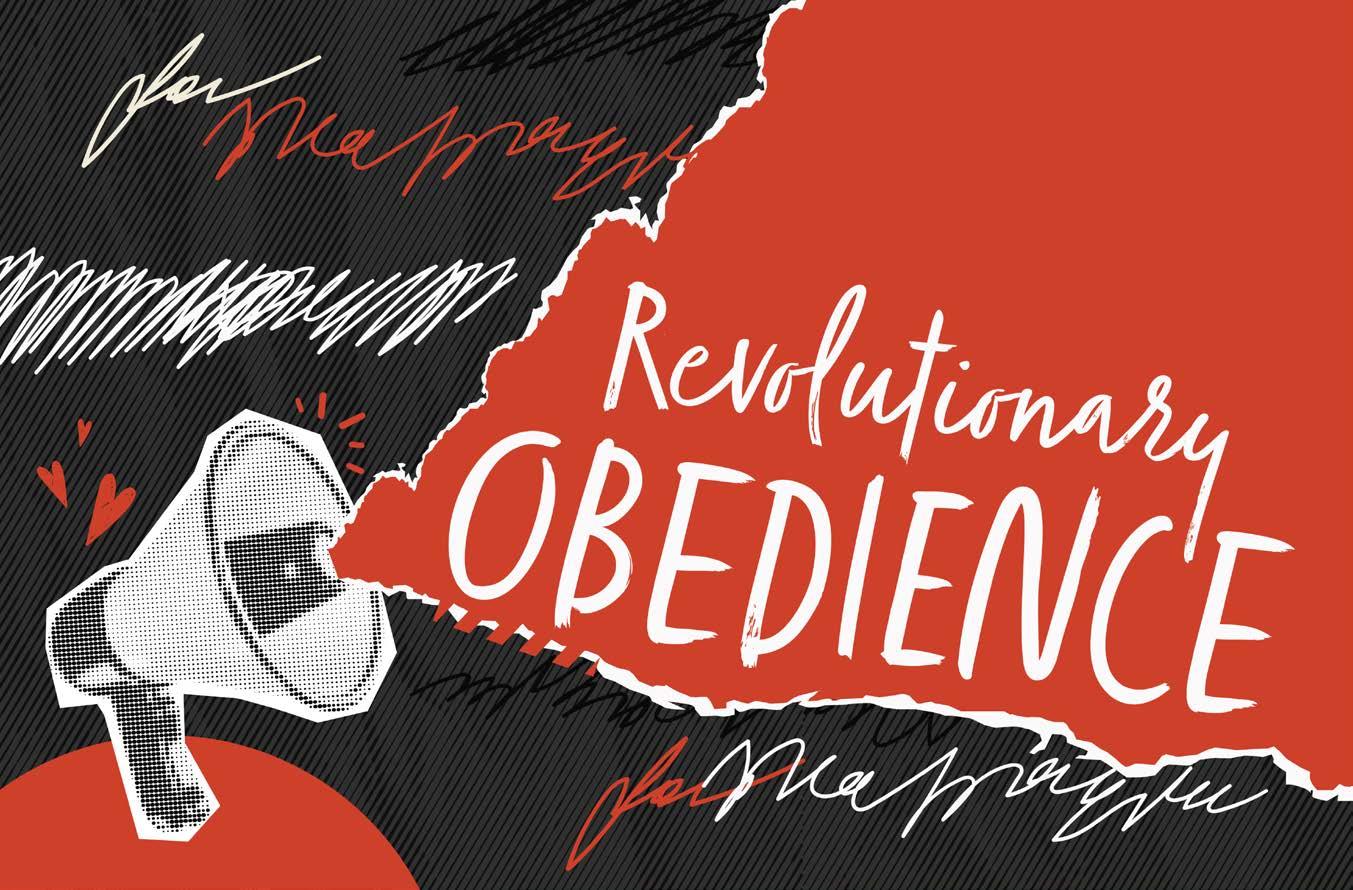
BY CAROL REID
“All power is given unto me in heaven and in earth. Go ye therefore, and teach all nations, baptizing them in the name of the Father, and of the Son, and of the Holy Ghost: Teaching them to observe all things whatsoever I have commanded you: and, lo, I am with you alway, even unto the end of the world” (Matthew 28:18-20).
Only a servant girl, she did not withhold the good news from her captor. She spoke to Naaman’s wife about the God in Israel who could heal even leprosy.
Unlearned disciples were not intimidated by the religious elite in Jerusalem. “We cannot help but speak about Jesus,” they boldly proclaimed to their opponents.
Paul could have been weighed down by heavy baggage; he had persecuted the early church, destroyed families, and terrorized communities. He could have carried the shame of his past, but instead, he shared the gospel with the same ardor he had once persecuted those who followed it.
Once blind, mentally ill, leprous, outcast, or lame, those who
followed Jesus began telling their stories to families, friends, and neighbors. The news was too good to hide. Limitations due to social status, education, nationality, or poor reputations were forgotten in their desire to tell others about Jesus.
The commission is bigger than the culture.
Undoubtedly, the culture is not friendly to the message. But your reputation is not the issue. Your preparation and background, even your comfort, are beside the point. At stake is the gospel. At stake is your obedience to the Great Commission (Matthew 28:18–20), given to all who follow Jesus. His marching orders demand countercultural, revolutionary obedience to share the gospel.
We are countercultural as we acknowledge Jesus is all-powerful (Matthew 28:18). Jesus is a real Person, not an ideology or myth. He is fully God. He came to earth as a baby and grew up in an unremarkable Jewish family. He fulfilled every Old Testament prophecy about the coming Messiah.
When Jesus shared His final commission with His disciples, He did not start with the need. He did not start with their preparation. Instead, He started with Himself. “All power is given unto me,” He told them. He has all the power in Heaven because He is God.
We can’t understand or explain the workings of the Trinity, but we know Jesus Christ is one with the Father and the Holy Spirit. His power created the world. With His power, He rose from the dead. He has the power to forgive sins. He has all the power and privileges and authority of Heaven.
Jesus also has all power on earth. During His time here, the winds and waves were under His authority. He cast out demons and healed the sick. He blessed the bread and fish and fed a multitude. He spoke and the blind could see, and the lepers were restored.
So, Jesus commissioned His followers because He had both the authority to send them and the resources to empower them for the task.
We must begin at the same place as those first disciples. We recognize who Jesus is and bow to His authority. We submit to His leadership and follow His directions. It doesn’t matter if we are out of our comfort zones or even out of our zip codes. Because He is all-powerful, we have work to do — and strength to do it.
We are countercultural as we go into all the world with the gospel (Matthew 28:19). Culture will allow your faith to motivate you to be kind to others and to work honestly. It will permit you to be disciplined and generous, neighborly and devout. But culture also wants to gag you and handcuff you, exile you to the privacy of your home or within the walls of your church. If you keep your faith to yourself, culture will not argue. But you have a commission, and the clash is evident.
The Great Commission is not for a private audience. This is not a secret mission where the recording will self-destruct in
The commission is bigger than the culture.
thirty seconds. Christ’s instructions are an open command to every person who follows Him. His commission involves reaching out to others and sharing the message. The New Testament gives us multiple examples and clear instructions about sharing the message with others. By word and deed, attitude and action, we must actively share the gospel with those around us.
Every nation is included in this commission. We are not limited to those who look and sound like us. Of course, you have a natural circle of influence that begins in your home and extends to your community. But even in our own homes and communities, we tend to stick with the easy targets.
We might feel uncomfortable sharing the gospel if we think our message will be rejected. Go anyway. Share the message regardless of the outcome. Be bold to reach outside your community. How can you do that?
• Give so missionaries and Bible translators can go to unreached people.
• Expand your circle of influence by serving neighbors. Especially consider those learning a new language. Share your friendship and your faith with them. Get involved with organizations that help resettle refugees.
• Develop friendships with newcomers in your community. Eat at a new restaurant, visit a new section of town, smile often.
• Remember the “least of these,” those at the margins of society who are disadvantaged and struggling. Show them Jesus by your kindness.
• Volunteer as a tutor at schools or to assist needy families.
• Take a mission trip and share your gifts far from home.
• Pack a shoebox. Buy a goat. Brainstorm with your friends, small group, or family about other ways to share Christ. Open your eyes and your heart, and you might be surprised at the opportunities God gives you.
• Invest in Christian camps, Vacation Bible Schools, and Good News Clubs. Whether serving or giving (or both), support these events where the message of the gospel is clearly shared.
• Pray. Remember the prayer request of Jesus for God to send laborers into His harvest (Luke 10:2). Adopt a missionary or an unreached people group and pray for them. Pray the Lord will move in unusual ways to reveal the gospel to all people.
Remember, there is no Plan B. If we do not share the gospel with those who have never heard, we will be held accountable. Scatter seeds everywhere you go.
We are countercultural as we make disciples (Matthew 28:19). Most of us will not encounter cultural opposition as we make friends with others. Others are happy for you to be helpful and charitable, if you leave faith out of it. But when you start to make disciples, you’ll find quite another story. You’ve heard the complaints: you should keep your religion to yourself! You have no right to tell me (or her) what to do! You do you; just leave me alone!
What does Scripture teach us about the importance of EXAMPLES?
Read more in the following passages:
• John 13:15
• 1 Peter 2:21
• 1 Timothy 4:12
• Mark 8:34
• 1 Corinthians 11:1
• Philippians 2:5
• 1 John 2:6
This is the job description, though. As we go, we make disciples, sharing what Jesus has done for us. We tell our story and His story and invite others to make it their story.
We are powerless in ourselves to accomplish the task of making disciples. The fruit comes only from our Heavenly Father. But the fruit cannot come unless the seed is planted. That’s our job. Plant. Water. Wait. Repeat.
This is what disciples do. They make more disciples. This mission is critical in your own home. Your children and grandchildren, nieces and nephews, are your primary mission field. Invest in preparing
If you keep your FAITH to yourself, culture will not argue. But YOU have a commission, and the CLASH is evident.
their hearts to accept Jesus through telling His story and praying faithfully for and with them. Don’t put any obstacles in their way.
Plant the seed at your Bible study. Water the seed in your small group. Cultivate the ground at the committee meeting or PTA group. Add fertilizer at Vacation Bible School or Good News Club or campus groups.
Then, don’t leave those baby Christians to try to grow up on their own. Baptism is a natural next step as a clear symbol of the work Christ has done in moving us from death to life. Help those young believers understand their commitment and follow through on it.
We are countercultural as we teach them to do all Jesus commanded (Matthew 28:20). The task is big. It involves shaping another’s thinking. Again, our culture will be offended by this so-called indoctrination. They will call it “brainwashing” and shudder at intentional instruction instead of allowing others to find their own way and seek out their own truth. But we must protect against error and help others grow in the grace and the knowledge of the truth. How can we do that?
BIBLE STUDY. You cannot teach all Jesus has commanded us without studying His Word. This is no pick-a-page or verse de jour study either. Every believer needs a systematic, thorough study of Scripture — Genesis to Revelation, hard spots and easy spots, both the “amen” and “oh, me” sections. This kind of teaching takes time and commitment. It requires strategy and investment, first to understand and then to apply. It means rubbing elbows with other learners, following in the footsteps of scholars, and digging into the “meat” of Scripture, preparing to ground other disciples in foundations that cannot be shaken.
MODELING. We know it is easier to follow a YouTube video than to read instructions. Yet having both is ideal. That’s one reason Jesus came — to fulfill the Law as a perfect example to follow. We walk in His steps. We follow His pattern. In turn, we also provide flesh and blood lessons as we mentor and model those who follow us.
Is this too hard? Absolutely! We cannot do it. We cannot stand against the culture to accomplish the task. We are unable in our own strength to do what Jesus commanded us to do. But that’s why He also gave His promise: “I am with you…alway” (Matthew 28:20b).
The presence and power of Jesus means we do not face this countercultural commission alone. And with Him, nothing is impossible.
About the Writer: Carol Reid is part of the curriculum editorial team at D6 Family Ministry and worships at The Donelson Fellowship in Nashville, Tennessee. She and her late husband Garnett have two great sons, two wonderful daughters-in-law, and five marvelous grandchildren.


Planned giving through Free Will Baptist Foundation not only has many immediate benefits financially but also lets you impact the ministries you love long after you have gone to your eternal reward. With the Foundation, you will enjoy: + Fixed income for life + Partial deduction + Tax-free or professionally-managed income + Avoid capital gains (in some cases)


BY BRENDA EVANS
The July sky was as yellow as sulphur. Heat was stifling, the Bundrens’ poor hillside farm baked brick-hard. A cyclone was coming, and Addie Bundren had lain near death for ten days in William Faulkner’s novel As I Lay Dying.
Doctor Peabody climbed the high hill to visit Addie’s bedside. He heard the push and pull of a handsaw. Cash, Addie’s eldest son, was building his mother’s casket. Addie’s husband stood on the front porch in faded overalls, a dark serge patch cut from worn-out Sunday pants stitched in place over one knee. In the bedroom, daughter Dewey Dell fanned the dying Addie in the smothering yellow light.
Vardaman, Addie’s youngest son, was stricken with fear at the sight of the casket and at the relentless push and pull of Cash’s saw: “Are you going to nail her up in it, Cash?...Are you going to nail it shut?”
Seventy-years old and fat, Dr. Peabody was winded and disgruntled from the steep climb. The smell of death floated in the sulphurous air. Addie moved only her eyes, first to Dewey Dell, then to Dr. Peabody. Pitilessly, the doctor thought to himself that her death was not worthy of his time, her death no more than a tenant moving out of a tenement house. “That’s the trouble with this country….shaping and creating the life of a man in its implacable and brooding image,” he muttered to himself.
The Bundrens had promised Addie to bury her with relatives in Jefferson, some forty miles away. The remainder of As I Lay Dying dramatized the tragic yet humorous journey, while Addie’s unembalmed body jostled for nine days in the hand-made casket on a mule-drawn wagon toward the chosen burial site.
Doctor Peabody’s words that “the country” shapes a man’s life bears out in Faulkner’s novel. The Bundrens were poor and troubled, but also self-serving and quarrelsome. By the novel’s end, Peabody’s words make a broader sweep than the hard-up, fractious Bundrens. Though we have choices, we, too, are influenced by our “country” — our family, friends, community, and culture that try to bend and shape and create us.
It’s true, isn’t it? All these place pressure upon our lives. We know damaged and mangled families, broken relationships, and ruined values. Often those are our own families.

As I revisited Faulkner’s novel, I also revisited Ecclesiastes, a hard book for me. Solomon is bold and unrelenting. He looks me in the eye, speaks straight into my face. Solomon’s Ecclesiastes is like Versailles’ famous hall of 357 mirrors. It reveals, reflects, throws back who I am, what I am — and what I look like to the Lord and others.
Fact is, I can resemble the Bundrens: snippy, contemptuous, greedy, ignorant, cold-hearted, self-focused. Between Faulkner and Solomon, I felt tromped on and rolled over by mules pulling a steel-wheeled wagon with a jostling casket on top. Many of us know that pain.
Seven passages in Ecclesiastes struck my soul especially hard:
• A handful of quietness is better than two handfuls of chasing the wind (4:6).
• It is an unhappy business to never be satisfied (4:8).
• A fool voices many words (5:3).
• Don’t love money because money won’t ever satisfy (5:10).
• Never let my stuff own me (6:1-2).
• Get discontented with discontentment and with an appetite that is never satisfied (6:7).
• Don’t let my stuff and my culture suffocate my soul (6:12).
When I’m messed up like the Bundrens, or living “under the sun” and “chasing the wind,” as Solomon warns, what do I do? To borrow a secular term, I rightsize my life. I begin to live “under Heaven,” not “under the sun.” I turn from self-centeredness, indulgence, faithlessness, and greediness. I move toward God, sound reasoning, gratitude, and purity. I strive to love God, my neighbor, my fellow believers. I live as the Lord’s friend. I rightsize my life.
How do I do that? How do I rightsize my life?
Repeatedly, Solomon offered guidance for how to realign our values and live a good and wise life “under Heaven” — that is, under the Lord’s superintendence. Uncluttered and purposeful. A life put to good and holy use.
First, don’t forget rightsizing is not the same as downsizing. Downsizing is often a one-time event — cutting back, making things smaller. Rightsizing is almost always an ongoing process. It means adjusting, realigning, decluttering, improving, making better use of. The best companies, businesses, and
industries regularly rightsize. So should we, both physically and spiritually. Though Solomon never uses the word, Ecclesiastes teems with ways to rightsize life. I’ll mention five.
Evaluate. Are my attitudes, my lifestyle, my “stuff” hurting me? Solomon called these things evil (5:13). The Hebrew word hurt in verse 13 is rah (in English). Rah has ten or more shades of meaning for evil — not just bad morally and ethically, but the entire gamut of good and evil. Rah depicts evil as absolute trouble, vileness, and ruin. The fictional Bundrens are hurt by their lifestyle, their greed and competition, their bickering, and even by their meager “stuff.” Am I?
Admit. If there is hurt as Solomon depicts it, will I own up to it? Whatever his eyes desired, Solomon says, he pursued, until he admitted it was all vanity, an unhappy business. Is that me? Is my heart never satisfied (4:7-8)? Am I content to live with discontentment? Am I chasing the wind — going around and around to gain nothing but weariness and more dissatisfaction (1:6-8)? To Solomon, the wind was an insubstantial vapor, a wisp of fog — a nothing. It cannot be caught, harnessed,

tamed, controlled, or held (2:11). What unhappy business, what wind am I chasing?
Decide. To rightsize my life according to Solomon, I must decide what to do. Someone recently warned that if I decided to go rock climbing (which I certainly will not), I should be careful what I grab on to. “Some rocks are unstable,” she said. Many of Ecclesiastes’ 222 verses suggest something like that. We often try to grasp the unstable, the insubstantial, the worthless. Such grasping is ultimately futile.
Do I want my life to be more than the stuff I cling to — houses, land, furniture, bank accounts, investments, retirement funds, “toys,” books, hobbies, electronics, or whatever? In the end, every one of these may prove unstable, even insubstantial in the deepest sense. Decide to keep “stuff” in its right place.
Implement. Work a plan to live life “under Heaven.” Commit to a holy and sacred simplicity. Declutter both physically and spiritually. In the early 1960s, my husband, Bill, visited a woman in a small New Hampshire town near our church. She led Bill along a narrow path through various rooms of her home, all stacked to the ceiling with stuff. “There are two pianos in here somewhere,” she whispered. She seemed
guilt-ridden about the mess she was in, but unable to declutter either physically or spiritually.
A holy and sacred simplicity will declutter every day with the Lord and His Word, a fresh self-surrender — giving back to the Lord what we’ve grasped as our own. Let go physically and spiritually. Practice gratitude for our blessings large and small. Devote ourselves to a tranquil heart. Abandon “the pursuit of the next best thing,” as T. M. Moore says in his book, Ecclesiastes: Ancient Wisdom When All Else Fails.
Adjust. Many in business and industry rightsize regularly. So should I, for rightsizing is an ongoing process. It is a daily walk with and for the Lord, not a one-and-done event. So, I will revisit Ecclesiastes regularly. I will take a new look at Solomon’s old wisdom and the mystery and counsel of my Creator (11:5). He is the One who put eternity in my heart, who makes everything new, who recreates and rightsizes me in His image (3:11).
Lord, I want to rightsize my life. Declutter me. Remake me in Your image. Amen.
About the Writer: Brenda Evans lives and writes in Ashland, Kentucky. You may reach her at beejayevans@windstream.net.

BY PAUL V. HARRISON
“Preach the word; be instant in season, out of season; reprove, rebuke, exhort with all
longsuffering and doctrine” (2 Timothy 4:2).
Nineteen-year-old Charles Spurgeon had doubled his country congregation to over four hundred members, and reports of his eloquence reached William Olney, a prominent layman in the New Park Street Chapel in London. This church boasted a rich history. Such luminaries as John Gill and Benjamin Keach had led the congregation. However, over time, attendance had declined, and every Sunday the church’s twelve hundred seats reminded its two hundred parishioners of better days.
Under such distress, the London congregation took the unusual step of inviting young Spurgeon to preach for them. He wrote back, making sure they understood he was only nineteen, offering the opportunity to withdraw their invitation if his age put them off. It did not. So, on Saturday, December 10, 1853, Spurgeon made his way to London.
He spent that night in a boarding house, and several people, as if in collusion to frighten him, described the great and learned men who filled the famous city’s pulpits. In bed that night, he “tossed in solitary misery.” The next morning, he headed to church along the historic streets. Nearing his destination, his eyes fell on the “large, ornate, imposing structure” where he was to preach. “Wondering, praying, fearing, hoping, believing,” he later recalled, I “felt all alone and yet not alone.” He spoke on “every good and perfect gift” that morning and in the evening, to a larger audience, on those “without fault before the throne of God.”
More trial Sundays followed, and after a probationary period, the church called him unanimously. Spurgeon spent the rest of his life there. His sermons read like he had polished them for months. In fact, he spoke after little focused preparation. As much as his busy schedule would permit, he would consume literature like lions devour meat. Then, Saturday night, he would hole up in his study, settle on a text, and scratch out a few notes.
Spurgeon didn’t preach through books of the Bible, opting rather to determine the need of the hour. Listeners
never would have guessed his sparse specific preparation. On Sunday afternoons, he followed the same process to prepare for Sabbath-evening. Week by week he climbed the platform, telling himself on each of the dozen or so steps, “I believe in the Holy Spirit.” He hated pulpits: “What horrible inventions they are!” No lawyer would ever plead his case “buried alive almost up to his shoulders.”
The congregation grew. Six years into his ministry, membership rose to 1,494. Years later, having built the Metropolitan Tabernacle to accommodate the crowds, the roll numbered 5,472. While some transferred in from other churches, including his wife-to-be, the foundation of the congregation’s growth came from conversions. The last ten years of his pastorate, the church averaged 269 baptisms each year.
Along with outward success, Spurgeon faced many difficulties. Illnesses such as nephritis, gout, and rheumatism plagued him. He chronically waded through “deep waters of mental depression,” resorting often to Mentone, France, for rest and healing.
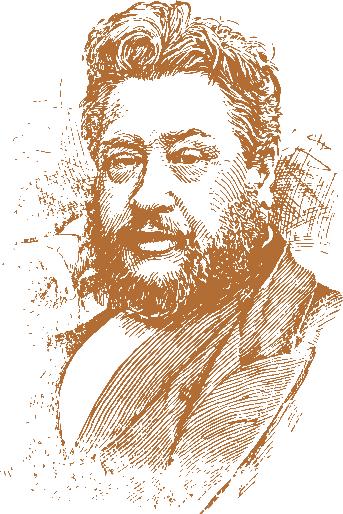
Finally, January 31, 1892, his body gave out.
Students carried the beautiful olive-wood casket to the church he had served so faithfully. From 7:00 a.m. to 7:00 p.m, sixty thousand mourners in double file paid their respects. Several services memorialized the great preacher. When the last ended, a choir of orphan boys sang as the coffin was carried down the aisle.
About the Columnist: Paul V. Harrison has pastored Madison FWB Church in Madison, Alabama, since 2015. Previously, he pastored Cross Timbers FWB Church in Nashville, Tennessee, for 22 years. He was an adjunct professor at Welch College for 17 years, teaching church history and Greek. Paul is the creator of Classic Sermon Index, a subscription-based online index of over 66,000 sermons, with clients including Harvard, Baylor, and Vanderbilt, among others: classicsermonindex.com.
BY JOHN BRUMMITT
We all know saving money provides tremendous advantages to our bank accounts and finances. But did you know that having savings also boosts your mental health? We sometimes think of savings as something painful, especially in the present, but research reveals the future benefits of saving aren’t as distant as one might think.
A recent report of the household saving rate in the U.S. by the Bureau of Economic Analysis revealed a decrease in household savings to 4.80%. This is a significant drop from the all-time high of 32.00% in April 2020. More than one in four Americans have less than a thousand dollars in savings.
As we have seen, routine expenses have continued to grow over the last several years, and the chances of having more than a thousand dollars in unexpected expenses is much more likely now than just a few years ago. Saving is something many people struggle to do, but once it becomes a habit, you put yourself in a better position mentally as well as financially.
For many, lack of savings creates psychological distress, though we may not identify it as a significant cause of stress. However, when you consider the benefits of savings, you can see how the future return on your savings appears more quickly than anticipated.
Consider just five of the numerous psychological benefits of setting money aside for the future.
A sense of financial security or peace of mind. If we are running paycheck to paycheck, living on the max of our income, it causes stress.
A cushion to handle the unexpected provides us with some “breathing room.” A savings cushion brings peace of mind by providing a lifeline to grab if the unexpected does occur. While everyone with healthy savings doesn’t live stressfree, building a healthy cushion reduces the number of events to worry about because the margin gives you options. Having options brings peace of mind and keeps you from desperate decisions. Savings can be treated like a self-funded insurance policy upon which to draw when the unexpected happens.
make better choices. While a sense of security and peace of mind is primary, another benefit is the flexibility to make financial choices. When living on the edge of a budget, the loss of a job or an unexpected major expense can cause everything to come crashing down. This causes us to scramble to make ends meet, since we were flying without a safety net. However, with an adequate cushion in savings, you have time to look over your options and the flexibility to choose next steps. This ability to choose provides a psychological benefit for people. Studies show that people dreading an upcoming meeting with their boss feel more positive when they have a choice regarding some

aspect of the meeting. For example, having the option to suggest a location or select refreshments makes an employee feel more positive about the meeting. Choices give them the feeling of control. This is also true of savings. While a cushion may not offer complete control over a situation, it does give breathing room to keep us from being overwhelmed.
3. Freedom. People with adequate savings have more freedom than those without. Most people have financial responsibilities: debt, family, or other living expenses. Living in this world means we must buy items and look after those in our care, and it costs us something. Notice this article does not say you should never go into debt. For most people, some major purchases are inaccessible without debt, such as a house. But we should avoid debt that could be avoided by having healthy savings. U.S. credit card debt reached $1.14 trillion in the second quarter of 2024. This is up 5.8% from the previous year, with the average individual balance hovering around $6,300. Around 60% of people with credit card debt
have had it for over a year. Individuals with savings feel less burdened by debt. When you are burdened by debt, you pay out of your income for the principle, interest, and fees on that debt. Having savings and reduced debt allows you to make better use of your income. Also, the weight of debt is great. Romans 13:8 instructs us not to owe anyone anything, except to love each other. The additional weight of debt causes stress that is neither needed nor helpful.
Increased
A sense of financial security or peace of mind.

Saving money instead of spending it is not easy. If it were, there would be no debt, and people would have no need for financial advisors (or articles like this one). But a savings habit doesn’t have to be a power of will every second of every day. Auto contributions or distributions from your paycheck into a savings account for each pay period can be completed through just a few clicks. And although you are using these tools, you still receive the benefits of self-discipline. Once the funds are separated from your daily accounts, it becomes easier to resist using them, since they are already held in savings. This self-discipline can expand into other areas. The psychological inertia that initially keeps you from saving works in your favor once you start saving through automatic deposit or transfer. Reducing the number of daily financial decisions has a positive effect on your psyche.
5. Improved feelings of happiness and satisfaction.
This psychological advantage leads to improved relationships and a positive outlook. While finances are not the leading cause of divorce in the U.S., stress from money regularly lists among the top reasons cited when filing for divorce. Stress over finances strains relationships, not only with spouses but with friends and family as well. In today’s environment, we constantly compare our lives with those around us. The “bandwagon effect” is a psychological phenomenon in which an individual does something because

others, particularly a large group, are doing it. The bandwagon effect causes us to act or behave like others, even when the actions go against our personal beliefs or are ill-advised. Many people become concerned with “keeping up with the Joneses,” which leads to anxiety and depression. When savings are set aside and our financial house is in order, we reduce anxiety and depression and increase happiness, satisfaction, and contentment with our lives. While we can still fall prey to the bandwagon effect, having savings and reserves that increase each pay period allows us options for better decision-making, keeps us from adding unnecessary debt, and reduces strain on our relationships and families.
Saving provides far more than just financial benefits. It impacts our psychological well-being, a crucial aspect of mental health. Our mental health guides our sense of purpose and helps us cope with the challenges of daily life.
God created us with complex, beautiful emotions and mental capacities. Limiting stress helps us remain healthy and function to the fullest. Small changes in how we spend and save can help provide, protect, and keep us functioning in what God has called us to do.
About the Writer: John Brummitt became director of Richland Ave Financial (formerly FWB Board of Retirement) in January 2016. He graduated in 2011 with an MBA from Tennessee Tech University. A 2004 graduate of Welch College, he has been with Richland Ave Financial since spring 2006. Learn more about retirement options: www.RichlandAveFinancial.com.


BY DAVID BROWN, CPA
In the financial world, we are always dealing with this question. Some would encourage you to take no risk, but if you are saving for retirement to supplement your Social Security income, taking no risk will leave you with a small retirement account.
Many times, avoiding risk completely means losing money as well. It’s just slower because the no-risk return will often be less than the inflation rate, which means you are still losing. If you are younger, with many years until retirement, you can take more risks; but if you have already done an excellent job saving for retirement, and you are only a few years away, it makes sense to reduce your risk to preserve what you have.
Sometimes, older people think they need to take a great deal of risk with their retirement account because they only have a few years and need to make all they can. The problem is a single downturn in the market just before retirement could make your golden years income significantly less.
Consider the S&P 500 for the last three decades. Over that period, the return has been negative eight times, flat once, and up for the remaining 21 years. If only one of those particularly bad negative years lands near your retirement date, it could impact your income in retirement.
Younger people can take more risk because they have more time to “ride out” the negative years. When market returns go down 20%, it takes a 25% positive return just to get back where you were. Some would protest that anytime the market is negative, it usually returns the following year with a good return to offset the loss. This is not always true. In 2000, 2001, and 2002, the S&P 500 was negative for three years in a row, and this has occurred at other times in the market’s long history.
Risk is also something we must manage in retirement. When you reach a point when you are required to make withdrawals from your account, you must consider you will need income for potentially 30 years or more. Therefore, while you can’t be too risky, you also can’t be too conservative.
Either way, it is a risk. If you are too conservative, you will
run out of money before you die; but if you take too much risk, you could lose too much, and what’s left will not last to the end of your life. If this is not an area you have studied throughout your life, perhaps you need professional help. If so, contact either Richland Ave Financial (formerly Free Will Baptist Board of Retirement) or Free Will Baptist Foundation.
About the Columnist: David Brown is director of Free Will Baptist Foundation. To learn more about the grants program, visit www.fwbgifts.com.
The Impact of My Dad’s

BY CHRIS COMPTON
You probably didn’t know my dad. His name was Gary, but it wasn’t a household name, and he never sought any sort of fame. Still, he left a legacy that resonates deeply with those who knew him, me included. His life was built on faith in Jesus, love for all, and service to others. These things didn’t bring him human praise, but they touched the lives of everyone he encountered, demonstrating true impact doesn’t require a spotlight.
My dad’s legacy taught me that living a life rooted in faith, love, and service is powerful. The impact we leave on others matters more than any earthly recognition.
My dad’s love for Jesus was evident in everything he did. From his personal devotion to the Lord to his service in the church, he modeled what it meant to live a life dedicated to God. Dad didn’t just talk about faith; he lived it no matter where he was
or who he was with. He made sure his actions aligned with his beliefs. His faith impacted how he treated his wife, how he raised his kids, his work ethic, his handling of money, and his interaction with others.
As I reflect on his life and what I saw in him, I am reminded how he helped me understand faith is about more than words; it’s about being a genuine light in the lives of others, even when no one is watching. My dad’s quiet example taught me to value faith that is steady, sincere, and enduring, a faith others can see and feel through our lives rather than just hear in our words.
One area where my dad’s impact was most evident was his love for my mom. Only a few days before his passing, they celebrated 50 years of marriage. He loved her and cared for her. Their marriage wasn’t perfect, but it was built on love, respect, and faith in God. No matter the ups or downs, their love and
dedication to each other remained strong, setting an example of commitment I carry with me to this day. Witnessing their love and commitment shaped my understanding of what it means to truly honor your spouse.
Equally inspiring was his love and care for me and my siblings. He worked hard and helped provide a loving home environment. He spent much time with his kids (and grandkids) playing outside with them, coaching in sports, and cheering from the sidelines. He took care of us and invested in us. That love and care didn’t stop when I moved away; it continued into adulthood.
One of his most amazing traits was his care for and interaction with our friends, neighbors’ kids, and those he coached in sports. His love, kindness, and servant’s heart left a lasting impression on many. My dad showed me true success isn’t measured by wealth or fame but by the positive impact we make on others, especially younger generations.
As I reflect on my dad’s life, I realize the importance of leaving a legacy. Legacy isn’t about making headlines; it’s about the
lasting godly influence we have on those around us. My dad’s legacy isn’t just the memories I hold of him; it’s the countless lives he touched through his love, kindness, faith, and service. Each of us has the power to create a legacy, whether we’re well-known or not. My dad showed me a legacy built on faith, love, and service can resonate for generations.
Lasting impact is often quiet, humble, and without fanfare.
In today’s world, where success is often measured by popularity and public recognition, my dad’s life reminds me of a deeper truth. Lasting impact is often quiet, humble, and without fanfare. It’s a legacy worth striving for, and it’s the kind of legacy I hope to leave one day, just as he did.
About the Writer: Chris Compton is accounting administrator for Richland Ave Financial. He graduated in 2007 with an M.A. in Bible Exposition from Columbia International University. A 1998 graduate of East Tennessee State University, he has over two decades of administrative and financial experience in varied fields, along with seven years in pastoral ministry.

Does your current financial plan reflect your retirement ministry goals? Will you be financially prepared to continue carrying out the work to which God has called you? If you have not yet established a retirement plan, we can help!

BY DARYL GRIMES
On September 27, 2024, my life changed forever. We received reports of a potentially devastating hurricane, with forecasts of torrential rainfall and high winds striking an already saturated region. Having lived through hurricanes in Eastern North Carolina, I assumed, like so many others, that Hurricane Helene would bring a few hours of rain, perhaps some downed trees, and the temporary inconvenience of power outages, but life would return to normal before long. I was wrong. Helene became a disaster beyond anything I could have imagined.
To help you understand what unfolded during those early morning hours, let me start from the beginning. The church parsonage where I live has flooded before. The Swannanoa River is only about 75 yards from our deck. Randy Stone, a former resident of the parsonage, once told me he saw the water rise to the deck's edge in the past, but nothing too concerning.
As the storm progressed, I watched the river swell, creeping closer and closer to the house. My wife, son, and daughter-inlaw were still sleeping, unaware the water had already reached the bottom step of the deck. No previous resident had seen the water this high, and it was still rising.
I woke my family, and we evacuated to the church, further away from the river. Others from the church and community
slowly gathered at the church, as the storm continued to rage. We received word a dam had broken, and soon the church was surrounded by floodwaters. Then water began to seep into the basement. We moved upstairs to the sanctuary, and as we gazed through the windows, it became clear this flood was unlike anything previously experienced. We briefly considered climbing to the church’s balcony if necessary. Thankfully, it never came to that.
After the winds and rain subsided, we stepped outside to assess the damage. While our church basement and family life center were flooded, the only real damage was wet floors. Miraculously, the parsonage itself stayed dry inside, but the cement steps had been washed away and the chain-link fence
flattened. Our once-peaceful backyard resembled a warzone, littered with debris — downed trees, large rocks, gas cans, tires, and miscellaneous garbage.
News reports soon confirmed many roads were impassable due to fallen trees and mudslides. Visitors to the town were trapped and unable to leave. With the power out since early morning, businesses were closed, gas stations inoperable, and restaurants unable to serve customers. People had nowhere to go, and some had nowhere to stay. Communication was also a challenge, with cell phone service down in many areas.
On Friday, a handful of our church members came by to check on us. I told them we would hold a “parking lot service” on Sunday. Later that evening, a couple stranded by the storm stopped by. Although they lived only 30 minutes away, both I-40 and their alternative routes home were closed. They worked for a mission organization in Marion and were returning from Pigeon Forge when they got stranded. We offered them shelter, but they insisted on staying in their van. Gratefully, they also offered to help around the church and did so.
Having lived in Eastern North Carolina, I knew from experience rivers often do not crest until days after a storm. I feared the same might happen here, but thankfully, the water began to
recede. Saturday remained cloudy with the threat of more rain, but it held off. Throughout the day, we met more people stranded in Black Mountain — some only a few minutes or hours from home but unable to leave. Many had spent the previous night in their cars, running low on food, water, and fuel. We did what we could to help, offering bathrooms, snacks, and water.
Sunday’s parking lot service was small, but we shared prayer requests and stories from our communities. I didn’t preach but offered simple thoughts from Scripture and led us in a time of prayer, thanking God for safety and asking for His mercy on our community. After the service, I realized our freezer’s food was about to spoil, so I cooked everything we had and made plans to distribute it to anyone in need.
We didn’t have to go far; people came to us. A group of ladies looking for baby formula joined us for lunch, as did a couple stranded on their way to a wedding. We shared what we had and shared the gospel. That day, four ladies confessed Christ as Lord and Savior.
The following days are a blur. My son and daughter-in-law finally found a route back to Pennsylvania, while Michelle and I headed to Columbia, South Carolina, for a few days to refill prescriptions, shower at my niece’s house, and wash clothes.

No previous resident had seen the water this high, and it was still rising.
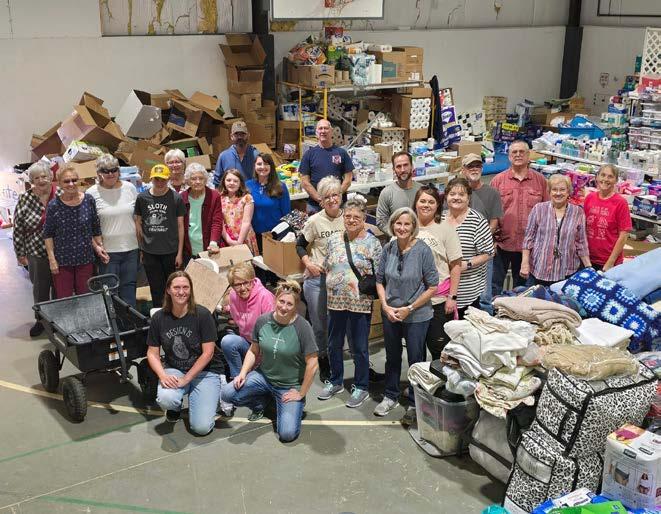

I believe every believer in Western North Carolina has a strategic opportunity to let the light of Jesus shine in the devastation left by this storm. We are here “for such a time as this.”

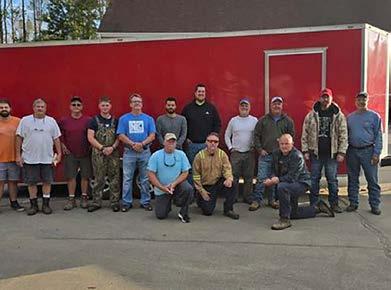

Others from our church joined us on the trip to purchase supplies. By the time we returned, power had been restored, though we were still without running water or Internet. Nonetheless, we felt it important to get back and serve our community.
In the weeks that followed, a steady flow of supplies and volunteers arrived. Strangers from up and down the East Coast showed up with truckloads of necessities. Brothers from Pittsburgh brought a U-Haul filled with supplies, while others from West Virginia delivered pallets of water. Churches from Greenville, North Carolina, donated twenty refrigerators to our community and another four to a sister church in Asheville. Tens of thousands of dollars were donated to help those who lost their homes and belongings.
Two Scriptures resonated with me throughout this ordeal. The first comes from the book of Esther, when Mordecai reminds Esther God may have brought her to the Persian palace “for such a time as this.” I believe every believer in Western North Carolina has a strategic opportunity to let the light of Jesus shine in the devastation left by this storm. We are here “for such a time as this.”
The other Scripture is found in Acts 2, where the early church took care of one another, selling possessions to meet the needs of others. Through this disaster, I’ve seen the Body of Christ come together, give, sacrifice, and serve like never before.
Because of the generosity of donors, Meadowbrook FWB Church has been able to minister to hundreds of people through supply distributions. We have coordinated over thirty debris cleanup operations. We hosted a propane fill-up and have seen hundreds of meals served by a variety of people.
But really, we are just a conduit, a channel. The supplies poured in, and the supplies poured out. The work crews came in, got their work orders, and went out. When you think about it, that’s what we all are as Christians. What do we have that we haven't received? You and I are just channels, conduits God has chosen to use to pour His blessings out to someone else.
I’m certain our valley will be changed forever — and I hope to be changed as well. My prayer is to continue being a conduit of Christ’s love and the Holy Spirit’s power to those who desperately need help and hope.
About the Writer: Daryl Grimes pastors Meadowbrook FWB Church in Black Mountain, North Carolina. Former NAM church planters, Daryl and his wife Michelle planted Flagship FWB Church in Erie, Pennsylvania, and have ministered in North Carolina, Michigan, and Ohio.
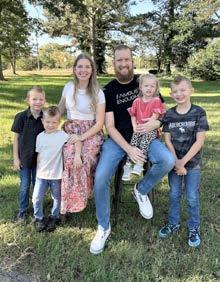
Raleigh, NC — David and Taylor Landers are new lead church planters in Raleigh, North Carolina. Their ministry is a joint church replant between North American Ministries and The Donelson Fellowship in Nashville, Tennessee. Once the Landers are established in Raleigh, they will relaunch the current work as a new church with a new name. David and Taylor both attended Welch College and have ministered in Free Will Baptist churches in Georgia and Virginia.
Before following God’s calling to Raleigh, David most recently served as the associate pastor of Mission Church in Virginia Beach, Virginia. The Landers have four children: Maximus, Moses, Shepherd, and Jules.
Though North Carolina is traditionally considered a “churched” state, Raleigh offers endless opportunities to share the gospel. The city is home to 16 colleges and universities with students from around the world, and approximately 390,000 people live within a 15-minute drive of the church’s current location.
Please pray for David, Taylor, and their children during this replant process. Ask God to help the leadership transition to go smoothly and pray He will call others to join their launch team.
San Diego, CA — Leah Williams has been approved to serve as a ministry support leader at NAM’s newest church planting team to San Diego, California. The San Diego team is led by NAM planters Christopher and Ashly Littlecreek, currently completing a church planting internship at City Lights CV, another NAM plant pastored by Amos Dillard.
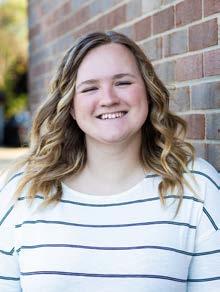
Leah is NAM’s first single female appointed to serve on a church planting team, and she is well-acquainted with the department and church planting ministry. Leah is the daughter of veteran NAM church planters Brian and Emily Williams. She moved to Buffalo, New York, at age 11 when her family planted NorthPoint FWB Church. The Williams family continues to serve at NorthPoint DePew, now self-supporting and planting a sister church in the area. Brian Williams remains the pastor and is a member of the NAM board.
Last summer, Leah visited San Diego on a mission trip with Teamwork Missions and felt God calling her to return and minister. Currently, Leah serves in children’s ministry
and leads both the worship team and a discipleship group at NorthPoint and assists with the youth group each week.
As a member of the San Diego team, Leah will continue working with children and in any other area God has for her. Her ministry experience and upbringing will serve as an invaluable asset to the San Diego team as they work to reach the area with the gospel. Please pray for Leah as she begins fundraising and works toward moving to San Diego next year.
Antioch, TN — It’s true! We really are better together! In the weeks following Hurricane Helene, Free Will Baptists donated over $170,000 toward storm relief through Master's Men Disaster Response. We also received truckloads of supplies, and many served on relief teams in multiple states regionwide. We have been overwhelmed by your generosity.
Thank you for acting as the hands and feet of Christ to those who need it most. As the work continues, may everything we do point back to HIM!
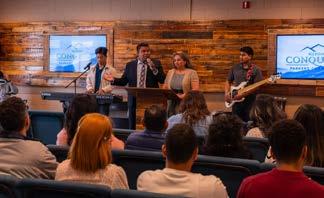
Greenville, SC — Services at Iglesia Conquista Parkers Chapel in Greenville, South Carolina, launched Sunday, November 3, 2024. Pastored by church planter Jaime Hernandez (Abigail), Iglesia Conquista is NAM’s newest Spanish-speaking congregation and part of Parkers Chapel FWB Church.
In addition to leading this ministry, Pastor Jaime is also president of the NAM Hispanic Bible Institute, which relocated to Parkers Chapel in summer 2024 and began classes in August. Please pray for Jaime as he and his family serve the church and institute. Ask God to grow both ministries into thriving, disciple-making works that make the gospel known in Greenville and around the world.
In places like the Pacific Northwest, one of the main obstacles church planters encounter is isolation. Often, church plants are alone in highly secular areas with little gospel presence. What if we intentionally planted a network of churches that could support each other in these difficult regions? A group of churches could encourage and sustain each other long after they have gone self-supporting. This kind of support system could make the difference between churches simply surviving long-term and thriving longterm. Imagine the Kingdom impact!
NAM is working to plant a network of three churches in the state of Montana. We already have several potential planters and have begun prayerfully considering building teams to reach areas such as Bozeman and Helena in connection with the well-established NAM church plant at Summit Church in Missoula.
If God is calling you to church planting in this (or any other) region, take the first step and reach out today. Call us at 615760-6137 or visit fwbnam.com/path for more information. We would love to come alongside you as you discern what’s next in your walk with the Lord.
While Master’s Men’s disaster response teams (DRTs) frequently serve throughout the United States, we sometimes expand our outreach internationally.
In 2010, Haiti experienced a massive earthquake, and thousands of Haitians were killed. Because of my personal affiliation with a small independent mission on the island, I was able to take a couple of teams to serve.
When Hurricane Beryl ravaged the Caribbean and devastated parts of the island of Jamaica last summer, several men who have served with Master’s Men DRT expressed an interest in partnering with Mission Four18 to continue disaster response work there.
Mission Four18 was founded by Len and Aimee Scott in 2018. The ministry specifically serves the Clarendon parish and surrounding communities, seeking to show the hope of Christ through gospel ministry and humanitarian efforts. Work includes hosting mission trips focused on construction projects, educational partnerships, and medical outreach.
In October 2024, a team of four from Master’s Men joined a team of men from Kirby FWB Church in Michigan to build homes for two families that lost everything during Beryl. While not an official Master’s Men DRT event, these men traveled at their own expense to serve others in the name of Jesus.
Thanks to Mission Four18 director Len Scott and his family for allowing us to serve these families. It was a blessing.
I am reminded of Nehemiah 4:6, when Nehemiah said the Jerusalem wall was rebuilt because the people had a mind to work. This is true of Free Will Baptists...and we ARE better together!
Ken Akers has been the director of FWB Master’s Men since 2002. He is also the CFO of North American Ministries and the Church Extension Loan Fund.
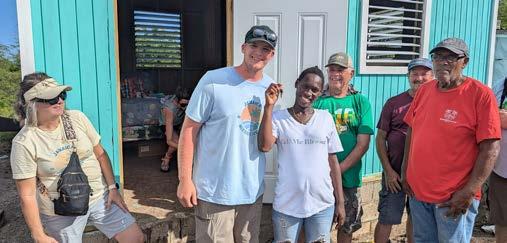



BY KEVIN BASS
On January 31, 2016, I took part in the first official service for Restore Church in Portsmouth, Virginia. Attending church my entire life set me up to expect certain things to just “work out” as they did in most churches I attended. I quickly learned, however, that without direction or vision, any team will flounder as everyone does what he or she thinks most important.
In our first few services, we set everything up and brought team members together for a huddle. We shared the day’s events, gave announcements, and prayed together. When we finished prayer, we instructed everyone to head to their service locations (junior church, nursery, audio video, etc.) and challenged others to find a place to welcome guests.
This was when it became apparent team members need direction and clarification. Without the right training, the moments following the huddle looked like an explosion of kindergartners released onto a school playground!
If we were going to be successful, we had to train our team members, communicating not only where to be but how long to be there and how to interact. So, whether you are part of a church a hundred years old or a church a hundred days from launching, it is vital to have training in place for your teams.
Training your church team is like preparing a winning athletic team, with each member bringing an A-game to strengthen the entire crew.
1. Get everyone on the same page.
Start with a clear vision and mission. Make sure your team knows the game plan and is all in.
2. Communication is key.
Communication is more than talking; it’s about connecting on a spiritual level. Keep the conversation open and remember prayer and reflection deepen team connections.
3. Build team bonds.
Team building is essential. Whether a community project or a relaxed retreat, the goal is to make your team tight knit.
4. Define roles clearly.
Ambiguity or lack of clarity is a killer. Clearly define “who does what” to keep the team running smoothly.
5. Invest in learning.
Keep the learning curve going. Workshops and training sessions aren’t just skill boosters; they add buy-in within the team, equip them for service, and grow their faith.
6. Support each other.
Beyond the work of ministry, support is about having each other’s backs. Celebrate wins and be there when things get tough emotionally and spiritually.
7. Keep first things first.
Don’t neglect prayer, Bible study, and reflection in your team routine.
8. Handle conflicts like a pro.
Conflicts happen. Equip your team with solid resolution skills, addressing issues with love, understanding, and forgiveness.
9. Spot and nurture leaders.
Identify potential leaders on your team and give them the boost they need. Mentoring goes a long way.
10. Embrace diversity.
Your team should reflect a mix of talents and backgrounds. Celebrate these differences; they make your team unique and effective.
11. Establish regular check-ins.
Observe and gauge your team’s performance. Listen to their thoughts and adjust as needed.
12. Offer spiritual gift testing.
Help your team discover spiritual strengths. A spiritual gifts test can help identify and develop each member’s God-given callings.
13. Take personality tests.
Uncover “unique wiring” through personality tests. This can help you figure out what teams are a good fit for certain team members.
14. Connect the dots.
Carefully form your team based on the results of the tests above. Align spiritual gifts, personalities, and roles for a well-balanced and effective team.
15. Tailor training.
Customize training based on what you know about each member. Give every team member the tools needed to shine.
In the end, training your church team is about bringing out the best in each member. It’s not primarily about individual growth; it’s about cultivating a passionate team who works to see people come to know God. Take time to pinpoint the greatest team needs and implement a starting point to create an effective team.
About the Columnist: Kevin Bass grew up in Virginia Beach, Virginia, where he fell in love with church and ministry. He and his wife Beth are passionate about helping couples and families grow stronger in their walk with God. Kevin oversees serve teams at Restore Church in Portsmouth, Virginia, and helps people get connected to their calling.
BY ALLAN CROWSON
Stewardship! “Yes,” you sigh, “here we go again with yet another periodic reminder to use our money for good things and give to the church and missions and all that. Being careful with what God has given us. Yeah, I know the drill.”
Sorry to disappoint you, but this article is not about that, or at least not just that.
“Oh, so it must be money and time, right?”
Closer, but still not quite there.
Let’s look closely at that word stewardship. Dictionaries often refer to how a person administers, manages, or controls something belonging to someone else. It implicitly looks forward in time to the reckoning when stewards account for their management.
Think about accountability for a moment. Consider three servants to whom their master entrusted varying amounts of money (Matthew 25:14-30), measured in a quantity they called talents. The servant with five talents doubled his investment. So did the servant with two. The wise and generous master commended them both and rewarded them.
The servant with a single talent did nothing with what he had. He claimed fear as his excuse, but the master saw through that. The fearful servant could at least have deposited the money somewhere to draw interest. No, he described the third servant as wicked and lazy (verse 26). Yes, he could have tried to work with what he had received. He might have failed; he might have succeeded. In truth, however, he just couldn’t be bothered. His behavior was not just lazy; it was wicked! He showed complete disregard for his master’s character, skill, generosity, values, or efforts. The master held him accountable.
The Apostle Paul told the Corinthians faithfulness was the big requirement for stewards (1 Corinthians 4:2). Faithfulness involves trust and obedience. Hmm, someone should write
a hymn about that, maybe call it Trust and Obey something of the sort! We are accountable to God to cultivate the attitude of faith and the practice of obedience, in every area of life and every phase of life.
What has our Master granted us to use before His return? Could we start with life itself? If you add up all the time you live, from beginning to end, you have your life. God has granted each of us one of the greatest gifts imaginable — life! We are stewards of our very lives, everything about our lives, including our:
• Skills, talents, and abilities.
• Health and physical condition.
• Emotional development.
• Influence.
• Church affiliation.
• Accomplishments.
• Challenges and even failures.
• Suffering, physical or otherwise.
• Choices, wise and foolish.
• Family.
• Thoughts.
• Attitudes.
• Actions.
• Resources. (Yeah, yeah, you knew there would have to be a tie-in with money. But did you notice how long the list was before we got there?)



Finally, as in Genesis 1, we come to the sixth day. We leave someone else to care for things after we are gone. We go to join our Creator. We leave our legacy — how we populated the different boxes of our lives — to those who build their own

We can use these questions to help navigate this in a respon-
address?
What is the earth and sky, sea and land of my life? What areas of responsibility may I have missed until now?
What is most appropriate for those areas at this point in my life? Students and grandparents share many of the same areas of life, but what is most appropriate for them may be very different! to practice faith- ful trust and obedience? This is a constant struggle at every stage of life. How can I trust God to yield an increase for what I put into His service? How will I act upon that trust? College students may fret about what work they will do, how they will find it, whom (if anyone) they will marry, and so on. Grandma or Grandpa may worry about declining health, dwindling resources, the state of the world they leave behind, or strained relationships they haven’t yet mended. Proverbs 20 reminds us young and old alike have their own particular strengths: The glory of young men is their strength, and the splendor of old men is
The Body of Christ, the Church, needs both the strength and enthusiasm of youth, and the wisdom and experience of the gray-headed, older folks.
How do we work to put things properly in place for those who will come after us? Building a life in faithful trust and obedience feels a bit like doing a jigsaw puzzle. When we actively as an offering to the God who will call each of us to account, figuring out what to do with money and
BY WILL HARMON
When I was a kid growing up in the 1960s in Midland, Texas, Mom would go into the kitchen after church on Sunday nights and fry us up some bologna. I remember climbing on the counter and watching the bolo gna bubble up in the frying pan. She let me cut its edges and press it flat. I grew up thinking fried bologna sandwiches were gourmet dishes fed to the rich and famous.
My wife Angie and I married in 1983. I still ate fried bologna sandwiches because I was in seminary, and we were poor. These days, Angie won’t fry bologna for me because she says it’s bad for my health. Well, that may be the case, but I still like it. So, one day a few years ago, I decided to make my own fried bologna sandwich. It sure did taste good and brought back some fond memories. But around bedtime, I was having regrets. Finally, after five soft-chew Tums®, I slept, but boy, did I have some strange dreams.
In one of those dreams, our church gave an entire Sunday morning offering to the World Missions Offering. I woke up the next morning wondering if it was a nightmare caused by indigestion or inspiration from the Holy Spirit. The thought wouldn't go away, so I met with my church board. I didn't share the part about the fried bologna, but I did tell them I felt the Lord was leading us to give an entire Sunday morning offering to the WMO.

The room got very quiet. Finally, one board member asked, “Can we do that?”
What he meant was, “Can we afford to give an entire offering to missions and still pay all of our bills on 51 weeks of income rather than 52 weeks?” No one knew the answer, but we decided to give it a try.
And it worked.
That year, we not only met our church budget, but we also exceeded it with only 51 weeks of giving. So, for the last six years, we have had a “Give It All Sunday,” where the entire offering goes to the World Missions Offering.
Last year, I ate another fried bologna sandwich and had another brilliant dream which led us to “up the ante” and challenge the church to give $50,000 to the WMO. We promoted it. We prayed over it. We encouraged our people to “take it to the next level” in giving to missions.

On WMO Sunday, I preached a missions sermon from the book of Jonah and told the congregation, “Today, IM is trying to raise a million dollars for world missions. I’m not a mathematician, but I did some calculations and was shocked to discover the entire WMO goal could be met if every Free Will Baptist church member gave just $5 today. You think, ‘How simple!’ But the reality is we’ve never raised that much in a single offering.”
After the service, one of my board members came up to me and said, “Preacher, I think the church will come through, but if we are short, give me a call and I'll make up the difference.”
His willingness was a great comfort, but we didn’t need it. After the offering was counted, I called Clint Morgan and asked if he could come to Cavanaugh Church and receive the gift the following Sunday. He came and brought Don Matchett with him. On that Sunday morning, we presented Clint with a check for $73,000.
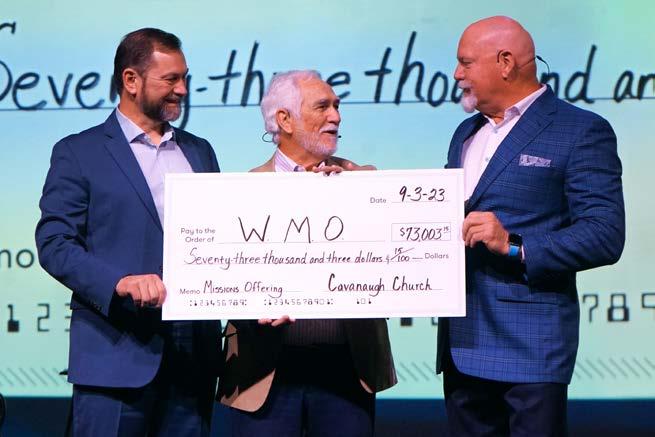
It is amazing what God’s people will do when they are challenged and follow the leadership of the Holy Spirit in their lives. A couple of months ago, I ate another fried bologna sandwich. I had another dream. And this year, our goal is $100,000 for WMO.
When’s the last time you ate a fried bologna sandwich? You never know....
About the Writer: Will Harmon has been the pastor of Cavanaugh Free Will Baptist Church, in Fort Smith, Arkansas, since 1997. Originally from Midland, Texas, Will accepted Christ at age six, recognized the call to ministry at age 11, and began preaching at 12. He served 12 years on the D6 Family Ministry board, 16 years on the Randall University board, and currently serves on the board of IM, Inc. Will and his wife Angie have three children and three grandchildren.
Antioch, TN — December 11, 2024, the IM Board met at the National Office Building in Antioch, Tennessee. Two board members began their tenures with this meeting: Paul Etterling (OH) and Chris Todd (OK). They joined Rodney Yerby (chair; AL), Will Harmon (AR), Darren Walker (NC), Casey Cariker (OK), Rick Cason (NC), Cameron Lane (AR), and Jeff Nichols (TN).
The board accepted the resignations of Reese and Charity (partners), Bryson Foulks, and Callie Stox Lydic. Director of Field Ministry Personnel Curt Holland remarked, “Life cycles are all around us. The Lord calls workers into the harvest fields. At times, the Lord also directs His servants to take different paths in ministry.”
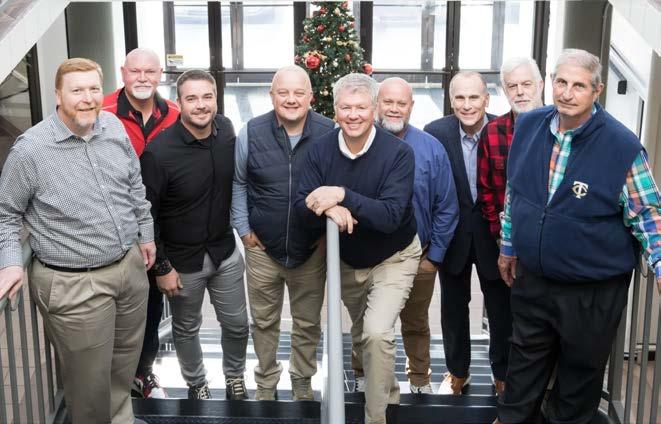
The board discussed the challenges of the general fund and solutions for adequate funding. The general fund plays a key role in supporting the entire mission of IM. It funds recruiting, vetting, training, and onboarding for missionaries. It also funds student ministries, short-term mission trips, partner ministries, necessary personnel infrastructure, and more. Don Matchett, director of development, observed, “A healthy general fund is vital for a healthy mission. While the general fund may not directly deliver the gospel message, it exists to support the gospel message. We need individuals and churches to partner with monthly gifts to IM for sustainable income.”
The Board adopted a 2025 total budget of $17.1 million, which includes operational ministries and personnel as well as IMpact, THP, and special projects. Blankenship CPA Group was appointed to perform the 2024 audit.
Presiding over his first meeting as chairman, Rodney Yerby surmised, “I am both amazed and humbled by the work God is doing around the world through IM. He continues to call Free Will Baptists to missions, and our people are responding. We continue to expand our partnerships with like-minded believers around the world, many in areas where western missionaries simply cannot go. I am excited about the future of IM!”
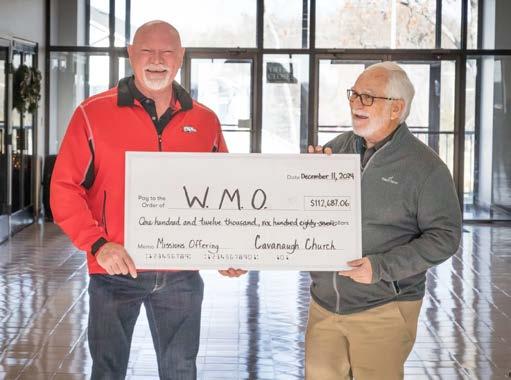
IM Board Vice-Chairman Will Harmon sparked great joy when he announced his church, Cavanaugh FWB Church in Fort Smith, Arkansas, received an offering of $112,687 for the 2024 World Missions Offering. General Director Clint Morgan gratefully accepted the giant check Harmon presented.
Morgan encouraged other churches and individuals, “Partner with IM in prayer for the challenges of the general fund. Praise God for those who faithfully serve on our mission fields. Participate in giving, so others can share the truths of the gospel with people around the world.”
Antioch, TN — According to Kristi Johnson, development communications manager, “The 2024 WMO theme embraced IM’s legacy and looked forward to God’s continued work through Free Will Baptists. We invite you to Continue the Mission this year as we partner together to strengthen the impact of our partnerships, missionaries, and the general fund.”
Kristi stressed three ways individuals, groups, and churches can Continue the Mission. Partner: learn more about the ministry of IM and join in the mission at www. iminc.org; Pray: lift missionaries and partners in prayer as they minister in difficult places; Give: make a commitment to give to the WMO, either with a one-time gift or a
Antioch, TN — The denomination and IM family lost three legacy missionaries in recent months.
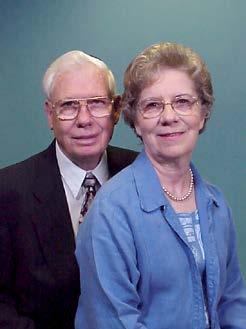
September 2, 2024, Dave Franks, Sr. went to be with the Lord at age 91. The first Free Will Baptist missionary to Brazil, Franks was appointed as a single missionary October 9, 1957. He arrived in Brazil January 1, 1958, and soon began language school in Campinas, São Paulo. During his first furlough, the Alabama native met Patricia Sturgill, a registered nurse.
He returned to Brazil in 1963, a newly married man. The couple continued in Campinas while Pat attended language school. Dave’s work in Brazil spanned 43 years, the addition of three children (Suzanne, Dave Jr., and Regina), and service in at least six cities. He taught in Bible institutes, public schools, camps, and Vacation Bible Schools. He hosted a radio program, planted churches, and served as field chairman multiple times.
The couple retired in 2000 and lived and served in Alabama. Mt. Olive FWB Church in Guin, Alabama, hosted his funeral.
monthly donation. Gifts are accepted online at www.iminc.org/wmo or by mail at IM, Inc. (WMO), PO Box 5002, Antioch, TN, 37011.
Every partnership, every missionary, and every aspect of the general fund helps IM labor with the Body of Christ to fulfill the Great Commission. It’s about the gospel.
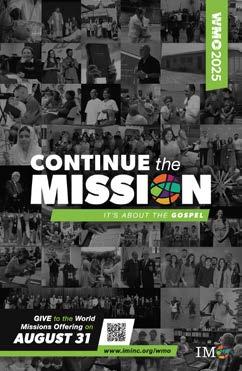
After several years of declining health, former missionary to Brazil Florine Faulkner Coscia died October 19, 2024, at age 89. A North Carolina native, she was born January 1, 1935. She wed Louis Coscia in September 1963, and they were appointed to work in Brazil a month later. Following language school, the couple moved to Pirassununga, São Paulo, in 1965 to help develop an infant church begun by colleagues.
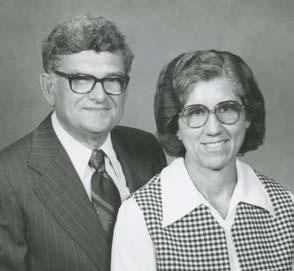
The couple spent most of their time engaged in church-planting ministry in Uberaba, Minas Gerais. Home to Brazil’s leading spiritist medium, they penetrated the darkness of satanic opposition and demon possession. Working diligently, they continued there with Florine ministering primarily to women and children.
Exhausted by the constant spiritual battle, they left the field in 1992, after 18 years of faithful service. Louis preceded Florine in death. A celebration of Mrs. Florine’s life was held in Asheville, North Carolina.
Continued on page 44
BY LESLIE NICHOLS
You just can’t forget some memories from growing up, and this is one of mine. It was THE Wednesday night after church…you know, the one where the youth group goes out to eat together for a specific reason? This was the night Truth and Peace selections were announced, and we all wanted to be together for it.
There we were, sitting outside the local coffee shop while the names were read online. One by one, we celebrated each other; we cheered and let out some squeals as we anxiously awaited each name. A few minutes (that felt like days) went by, the video concluded, and my name wasn’t called to return for my third year. Some of you may relate to the sinking feeling I experienced. Perhaps you weren’t accepted into a school club, hired for a job you wanted, or chosen for the athletic team for which you had practiced all summer.
Over the next few days, I kept remembering a moment from Truth and Peace the previous summer. I could still picture it like it was the day before: everyone sitting in a large auditorium while one of the staff members talked about the next year, and how some current participants wouldn’t return. The speaker went on to say
something like: “If you do not put into practice what you have learned during your time here, you’ve missed it.”
If I can be honest with you, up to that point, I had missed it. I wasn’t stewarding the opportunities and the abilities I had been given. Or, to put it another way, I was taking my gifts and abilities for granted. Whichever way you choose to identify the concept of stewardship in your own life, the principle remains the same. God has given all of us different gifts and abilities; what will we do with them?
Our denomination has many programs for people of all ages to use their gifts for the church, across the country and around the globe. I’m so thankful Free Will Baptist young people aren’t excluded from these opportunities. Each summer, students can apply to participate in Truth and Peace, as mentioned above, and IM sending programs: ETEAM (high school students) and College Missions Program (CMP; college students). Each of these denominational programs offers students opportunities to meet other like-minded students from all over the country, learn more about their various gifts, and put the lessons they learn into practice immediately.
Each summer, I have the incredible blessing to walk alongside your students as they participate in ETEAM and CMP. For ETEAM, we welcome students from across the country to the Welch College campus for a week of training before sending them overseas to work alongside IM missionaries and partners for two and a half to three weeks. For CMP, college students meet via Zoom over the course of their spring semester before flying overseas to spend between two and ten weeks serving alongside IM missionaries and partners. Sometimes, I wish

I had a video camera attached to my head, so people in the denomination could be encouraged by our next generation.
I am not a parent, but I have experienced what it’s like to be a “mom” as I accompany kids to the airport to begin their journey. Some students are so excited to experience the ministry and adventure at the end of the flight they forget to turn around and say goodbye. Others need a word of encouragement or a last hug from a familiar face before they step foot on that plane.
This isn’t an honor we at IM take lightly. We feel the weight and responsibility of these moments. And we always welcome questions from parents to help give them peace of mind while your students are in our care. The following are commonly asked questions I have received over the years. I hope the answers not only help you breathe a little easier (since, by the time you read this, your students will know their placement in these programs) but also reassure you we are stewarding your students’ time, gifts, and resources well.
Why is training week so long for ETEAM? Could students stay on the field longer?
If you have had a student participate in ETEAM, you know the schedule has been adjusted each year as we seek the perfect balance between training and time on the field. Many factors contribute to this decision: we bring together a group of teens and their leaders and attempt to create a team bond before they leave for the field. We want students (and leaders) to have a better understanding of cross-cultural and biblical principles and practices, and — the hardest at times — to be rested by the time they land overseas.
overseas (preferably two Sundays when possible). In short, yes, students could be on the field longer, but we want to make sure we steward their training for what they will face when they land.
How do you determine locations for ETEAM and CMP?
We hear this question often because many people, in the U.S. and abroad, would like to host at their church, or would like to host in general. (Often, hosts are former participants and leaders.) We appreciate these requests, and we wish we could fulfill them all. However, we send ETEAMs to IM missionaries, IM international partners, IM partners, and occasionally to U.S. church plants in partnership with North American Ministries. We are thankful for our missionaries and partners and the way they welcome students into their communities each summer.
How do you determine the cost for these opportunities?
Expenses are based largely on the destination’s cost of living, transportation costs, and the expenses of infrastructure during training week for ETEAM. The programs are trying to keep up with the ever-fluctuating prices, not only in the U.S. but also around the world. We are conscious of the amount we ask each student to raise and take extra precautions to ensure the funds are stewarded well. We do all we can to help students raise funds and provide fundraising tips and ideas through our social media channels.

Many things want your attention, your gifts, and your talents. Don’t let the talents the Lord has given you be wasted on something that does not produce fruit in your own life or in the lives of others. The Lord has called us to be a church, to be a whole body, and to bring all our gifts and abilities to the table for Him. Don’t let this moment be a time where you look back and realize “you missed it.” About the Writer: Leslie Nichols

BY PHILLIP MORGAN
Need is an incredible motivator. Impending danger to a loved one propels even the meekest person to face down fears and threats that would usually paralyze him or her. The presence of need focuses our attention precisely on a specific problem. Our vision narrows to a single point, and everything else is set aside for the moment. However, when we give full attention to perceived dangers in our lives, we sometimes lose sight of God. Like Peter standing on the waves, we allow our fears to reign and our faith in God to waver.
The author of Hebrews helps us understand our Christian life in light of Israel’s history. In Hebrews 3:7-8, he exhorts us to persevere in the faith to avoid falling prey to the sins of the Israelites in the wilderness who hardened their hearts and rebelled against God despite His wonderous provision. The warning is a good one we all should heed. We have been freed from our bondage to sin and are headed for the new heavens and the new earth. However, in this life we are still following the Spirit through the wilderness. We have not attained our goal; we have not yet entered our rest.
As we make our way through the wilderness, we, like the Israelites, depend on God’s regular provision. Where they fed on manna and quail, we feed upon the Word of God and Christ, the Bread of Life. God has fulfilled His promise to provide everything we need (Philippians 4:19). Yet sometimes we look up from the path before us to realize we have arrived in a dry and dusty land.
A loved one receives a bad diagnosis. A close friend passes away suddenly. Your boss calls you into his office to inform you the company is downsizing and encourages you to update your resumé. In these moments, our needs dominate our vision, and we grow worried and afraid. We begin to panic. How should we respond to these situations? We learn much from the Israelite response to their needs in the wilderness.
Forgetfulness. At least twice during their years in the wilderness, the Israelites found themselves in a dry land. In Exodus 17, we learn the first generation to be led out of Egypt quarreled with God about their lack of water just before meeting Him at Mount Sinai. Nearly forty years later their descendants made the same mistake when they were about to enter the Promised Land. I want to focus on this second instance, recorded in Numbers 20, because their unique complaint against God offers insight into a common experience among Christians today.
Numbers 20 opens by informing us Moses had led the Israelites back to Kadesh, the place where forty years earlier ten spies gave a bad report of Canaan, and the people rebelled with fatal consequences. Now that generation lay scattered in graves throughout the wilderness, and their children and grandchildren were preparing to enter the land. However, they found no water in Kadesh where they camped.
A lack of water is a serious problem, but the Israelites’ response reflects a misunderstanding of their true situation. They assembled themselves against Moses and Aaron and quarreled with them about their predicament, bemoaning they had not been consumed instantly by fire like the recent rebels who followed Korah. Instead, they were afraid they would thirst to death slowly in the desert. They even went so far as to call the place to which they had been led “evil” in comparison to Egypt (Numbers 20:5).
In the pressure of the moment, the Israelites became consumed by the problem before them. In their fear, they forgot the terrors and horrors of Egypt, including the murder of the innocents. They believed God would fail them there in the wilderness, despite the fact they had eaten manna and quail each day for the previous forty years. The place they considered evil was exactly where God intended for them to be. He intended to use their need to draw them closer to Himself and reveal His holiness through His provision (Numbers 20:13). Instead, they turned to grumbling and quarreling with the Lord.
In times of need, we are tempted to follow the Israelite example. Despite knowing we have been liberated from bondage to sin and are on our way to the heavenly city, we too are inclined to wonder if God can provide for our need in the difficult moments. We forget God has led us into this obstacle, or we question His wisdom in bringing us to a challenging place. How in the world will we survive what lies before us? Our myriad flaws will be revealed to everyone, and our failure will come with
We must be careful not to confuse God’s immediate provision with His promise of eternal rest and blessing.

shame. Would it not have been better just to leave us to live a quiet, out-of-the-way life? We forget how horrible our bondage was and begin to wish for the “good old days” when, as we falsely remember, we had few worries.
Impatience. The Israelites not only compared the present with the past, but they also displayed impatience with God’s timing to fulfill His promises. When they called their camp in Kadesh evil, they specifically noted it was a place without seeds or figs, vines or pomegranates (Numbers 20:5). They confused God’s promise for provision in the wilderness with His promise of abundance in the Promised Land of rest. They had manna and quail, but they craved the vineyards of Eschol and the figs of Canaan.
We too have been promised a land. Ours will be free of swords and filled with plows and pruning hooks. Each man shall sit in peace and comfort under his own vine and fig tree (Micah 4:34). However, as the author of Hebrews reminds us, we have not yet entered this land of rest. We are still following the Spirit through the wilderness, sustained by the Bread of Life.
We must not expect the rest, ease, and abundant fruitfulness of the land to which we are headed while we remain in the wilderness. Moreover, we risk our lives when we grumble against God’s provision in the moment, for we too may be struck down and kept from entering our rest for our unbelief as the Israelites were (Hebrews 3:8-11).
Despite their grumbling at Kadesh, God was faithful to provide water for His people. However, their quarreling led Moses and
Aaron into temptation, and their failure to obey in the moment cost them the opportunity to enter the Promised Land themselves (Numbers 20:12; Deuteronomy 3:26-27). How can we avoid similar failures? How can we best maintain our faith in God’s provision during trials?
First, we must always keep God’s past provision before our eyes. Read each day in God’s Word about His faithfulness to His people throughout time and space. As we read about the Israelites in the wilderness, Elijah against the prophets of Baal and Jezebel, Jeremiah in prison, and Christ on the road to the cross, we see God’s provision take many different forms. We also learn to say with Christ and the three Hebrew children that even if God chooses not to deliver us from the danger before us, we will still trust His wisdom (Daniel 3:16-18; Matthew 26:39, 42).
Second, we need to remember God’s deliverance in our own lives. Moses instructed the Israelites to keep their souls from idolatry by constantly reminding themselves and their children about God’s deliverance and providential actions in the past (Deuteronomy 4:9). Not everyone finds it easy to keep a journal, but it is wise to keep a written record of the many occasions when God provides for us. This practice can be as simple as keeping a running prayer list you can review to remember God’s attention to your needs over many years. We also need to share with our families about God’s provision. These constant reminders from Scripture and our own experiences will help us have a firm confidence in God’s wisdom in the moment.
Finally, we must be careful not to confuse God’s immediate provision with His promise of eternal rest and blessing. Perhaps you are like me: with age, your desire for the new heavens and the new earth has deepened significantly. As we become more aware of how broken and wicked this world is, we are tempted to become impatient with God. We crave peace and rest. We want a fruitful piece of land unaffected by the Fall and time to give our full attention to its care.
We must not confuse the future with the present. We are learning faith, hope, and love as we wait on the Lord’s provision in this dry and dusty land. We are learning to find our rest in Him.
About the Writer: Phillip T. Morgan is curator of the Free Will Baptist Historical Collection housed at Welch College in Nashville, Tennessee, where he additionally serves as History Program coordinator and professor. Phillip, his wife Megan, and their children live on a small farm in Robertson County, Tennessee. This article was adapted by permission from an essay published at www.HelwysSocietyForum.com.
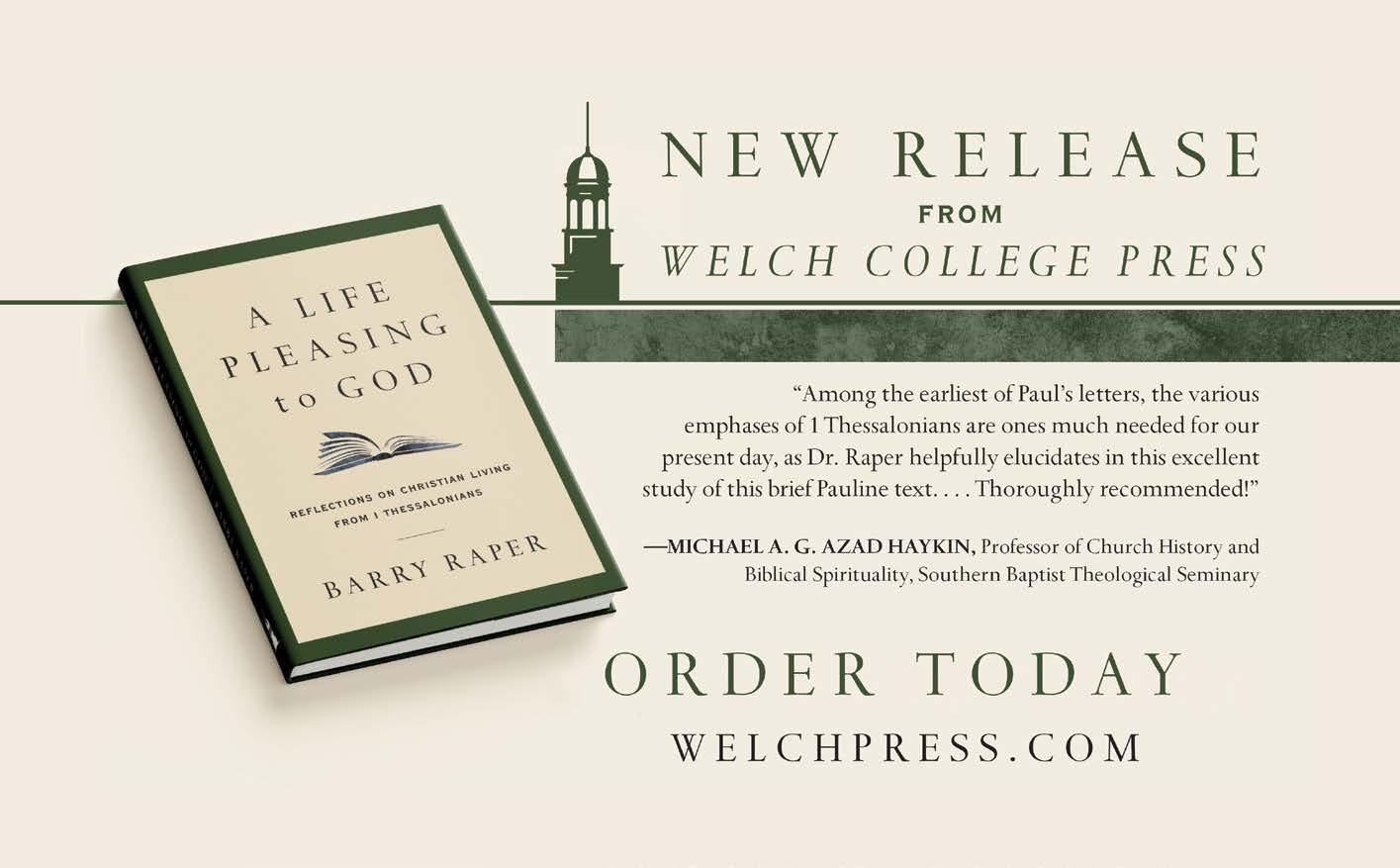
After being ordained in 1957, Carl Cheshier lived a life of ministry spanning six decades, four states, six churches, and a college presidency. Cheshier demonstrated leadership at every stage of his ministry. He served on the Arkansas State Missions Board, as Arkansas state moderator, and on the national Sunday School Board. He also served nine years as assistant moderator of the National Association (1988-1997) and as moderator six years (1997-2003). His longest pastoral ministry took place at Cavanaugh FWB Church in Fort Smith, Arkansas, where he stayed 28 years before accepting the presidency of Randall University in Moore, Oklahoma.
Why not establish your own legacy through The Together Way Endowment to support all national ministries?

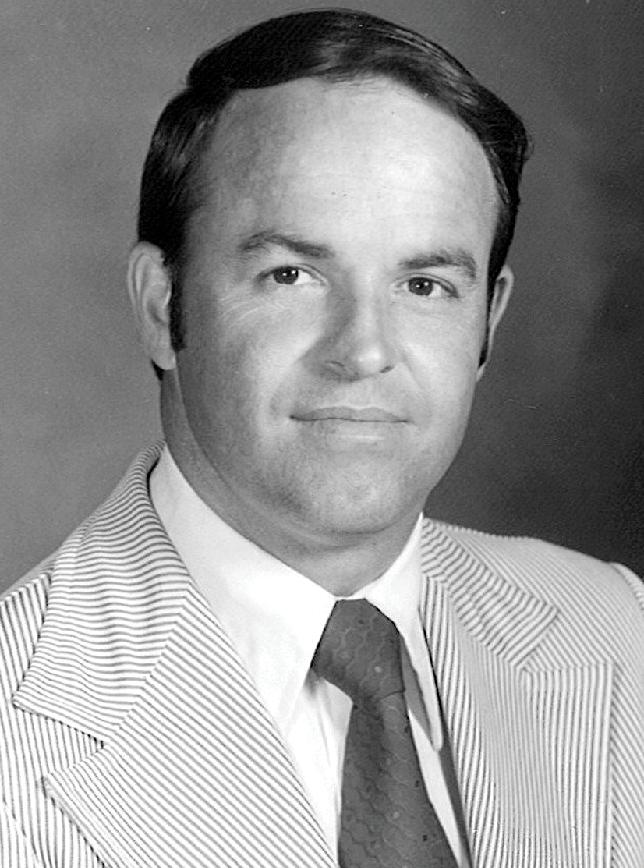

BY MATTHEW STEVEN BRACEY
This past May, I was privileged to officiate my third wedding. I am grateful to the happy couple, whom I consider dear friends. During the service, before leading them in the traditional exchanging of vows and rings, I shared a short message meant to instruct, encourage, and inspire. In this brief article, a shortened version of my message reveals four crucial purposes of marriage.
AND FRIENDSHIP
(GENESIS 2:22-25)
Some things in marriage must not be shared with others. Emotional, psychological, sexual, and spiritual intimacies are uniquely yours. Set up clear boundaries in your lives to protect what should be protected.
As a married couple, you are a family. Engage in family activities from the very beginning. Faithfully practice family devotions. Cook together (or at least be in the kitchen together while one or the other cooks). Shop together. Read books together. Continue to date and be romantic even after you marry. Prioritize trips away (preferably once a year). Invest in yourselves and your marriage.
But do not invest only in yourselves.
(GENESIS 1:28b)
A second purpose of marriage is fruitfulness. Fruitfulness is likely not the first thing that comes to mind when a young couple considers marriage. However, it is technically the first instruction God gave to humanity in the first chapter of Genesis: “Be fruitful.” Yes, fruitfulness refers to children, whether natural or adopted. But more broadly, it also refers to selflessness, generosity, and other virtues. Behind every command, law, or rule in Scripture is a principle. The principle here is selflessness. Fruitfulness is about investing in others as well as yourselves.
Do not think of your marriage primarily as an institution serving your own interests. Think of it as an institution through which you invest in others together, through which you serve others together.
Have children, yes, to the extent God calls you to do so. But also invite people into your home. Volunteer in your community. Encourage those God puts in your path. Go to weddings, funerals, graduations, and all the other important events that seem to arise at the most inconvenient times. People remember your presence.
Serve the church. In short, learn to think of the second great commandment, “love your neighbor,” not simply as an individual command but also as a corporate command. A “couple” command. Cultivate a fruitful marriage.
For these points of faithfulness and fruitfulness, imagine marriage as a quaint cottage. The cottage has windows and doors by which the outside world may come in — everything from sunshine and beautiful days to rain and storms. Your marriage is like that cottage, letting the outside world in.
Hence, it is a place where you can be fruitful, a place where you can invest in others, a place where you can serve others and practice hospitality. Some visitors to your cottage will be doing well, others struggling deeply. Some lives will be sunshine, others a storm. Use your marriage as a means to celebrate, laugh, grieve, and cry with the people God allows in your lives.
However, not every room in the cottage should be available to others; some rooms must remain off-limits, uniquely and specially yours. Protect those rooms with a fierce, godly jealousy.
A third purpose of marriage is to serve as God’s principal foundation for society, a logical consequence of the first two purposes. The public purpose of marriage explains why we as Christians care so deeply about defining marriage rightly within society. We know it is the foundation of society itself,
and if the foundation is compromised, the society it supports is also compromised.
Your marriage should be an example — a picture, a testament — of what society and culture should look like. Therefore, be the men and women God created you to be. Create, consume, and enjoy the kinds of culture that honor God. Support the kinds of social gatherings and societal norms that honor God.
Imagine your marriage as a movie. Bad movies are embarrassing and rightly the subject of criticism. Good movies, however, are wonderful. They astound, amaze, and inspire us; they focus our attention and passion and action in ways that are true, honest, just, pure, lovely, of good report, virtuous, and praiseworthy (Philippians 4:8).
Just as good movies are an important foundation of the cinematic arts, so also good marriages are an important foundation for the social arts. Sadly, not all marriages (or so-called marriages) provide good public foundations; they are like bad movies.
Your marriage should be like a good movie. How do you make a good movie? You follow the example of great directors. How do you make a good marriage? You follow the example of great marriages. Look to others and learn from them. How do they make it work? They build their marriage upon Christ and His Word.
The calling of marriage is a high calling, but it is not always an easy calling. So be patient and gracious toward one another. And remember that, in the end, God is the critic who matters most. Follow His vision for your lives.
FIGURE OF CHRIST (EPHESIANS 5:32)
A final purpose of marriage is to provide a figure or picture of the greater marriage between Christ and the Church. This is the religious purpose of marriage, a “great mystery,” said Paul, who spoke concerning Christ and the Church in Ephesians 5:32. Again, Revelation 19:7 reads, “Let us be glad and rejoice, and give honour to him: for the marriage of the Lamb is come, and his wife hath made herself ready.” These other purposes exist in subservience to this greater purpose: that your marriage would portray that greater marriage.
In the beginning, God gave Adam and Eve both priestly and kingly roles: to steward the earth (priestly) and have dominion over its creatures (kingly). Therefore, God gave to man and woman roles of both service (steward) and authority (rule).
THE CALLING OF marriage IS A HIGH CALLING, BUT IT IS NOT ALWAYS AN EASY CALLING.

In a manner of speaking, we see the model of servant leadership as early as Genesis 1. Jesus Christ, the agent of creation, perfectly demonstrates servant leadership in His incarnation, exercising authority over His Bride, instructing the Church in His Word, yet also doing so in holy submission to God the Father. Your marriage should reflect that marriage, including both service and authority.
Each of you are servants to the Lord and to one another, and each of you are leaders in Christ’s creation and Kingdom. In Ephesians 5, Paul instructed wives to submit to their husbands “as to the Lord” (verse 22), insofar as his leadership reflects the authority God has given him. That is, the husband’s leadership reflects his submission to Christ.
Paul then proceeded to instruct husbands to “love your wives, even as Christ also loved the church and gave Himself for it” (verse 25). Hence, the husband’s love, the husband’s authority, is sacrificial. It is not unkind or oppressive; it is patient and good and faithful and gentle (Galatians 5:22-23). In his leadership, the husband serves both the Lord and his wife.
The wife, in her submission, respects her husband as he submits to the Lord (Ephesians 5:33). At the same time, she recognizes her own role of legitimate authority and strength as a leader in the home. Proverbs 31:17 describes this well: “She girdeth her loins with strength, and strengtheneth her arms.”
In short, both husband and wife have duties of service and rule in different ways, and each balances the other in the best ways possible.
By enacting these four purposes, Christian couples can have a God-honoring marriage. Protect what is yours; be the very best of faithful friends; invest in yourselves. Serve others; be fruitful; invest in society. Recognize the public importance of marriage, which extends beyond your social circles. Finally, reflect the relationship between Christ and His Bride as a beautiful picture of that greater marriage.
About the Writer: Matthew Bracey, Ph.D., works at Welch College, where he serves as vice provost for academic administration and as a faculty member, teaching courses in history, law, and theology. He is a co-founder and senior editor of The Helwys Society Forum. This article is an adaptation of an essay that appeared first on HelwysSocietyForum.com.
Welch College has named Ellie Simpson financial aid coordinator, according to Craig Mahler, vice president for financial affairs. Mahler said, “I am delighted Ms. Simpson has agreed to join Welch to serve in this important role that helps with the financial needs of students and ensures compliance with federal and state regulations.”
Currently a senior majoring in Business Administration, Simpson will work part-time until graduating from Welch College in May 2025, after which she will serve in the role full-time.
“Ellie’s love for Welch College, attention to detail, outgoing
and friendly personality, and experience serving as a student employee in the Provost’s Office uniquely qualify her for this role,” Mahler said.
Originally from Missouri, Simpson is a member of Calvary Fellowship FWB Church in Fenton, Missouri.
Welch College will host the annual Forum25 conference
March 9-11, 2025. Speakers will include Dr. Carl Hargrove, staff pastor at Grace Community Church in Sun Valley, California; Eliza Huie, director of counseling at McLean Bible Church in Vienna, Virginia; Nicolas Serrano, senior

pastor of Grace Family Church in Rosaria, Argentina; Josh Baer, pastor of Cramerton FWB Church in Cramerton, North Carolina; and Welch Provost Dr. Matthew McAffee.
Registration is open at Welch.edu/Forum25 for this free conference.
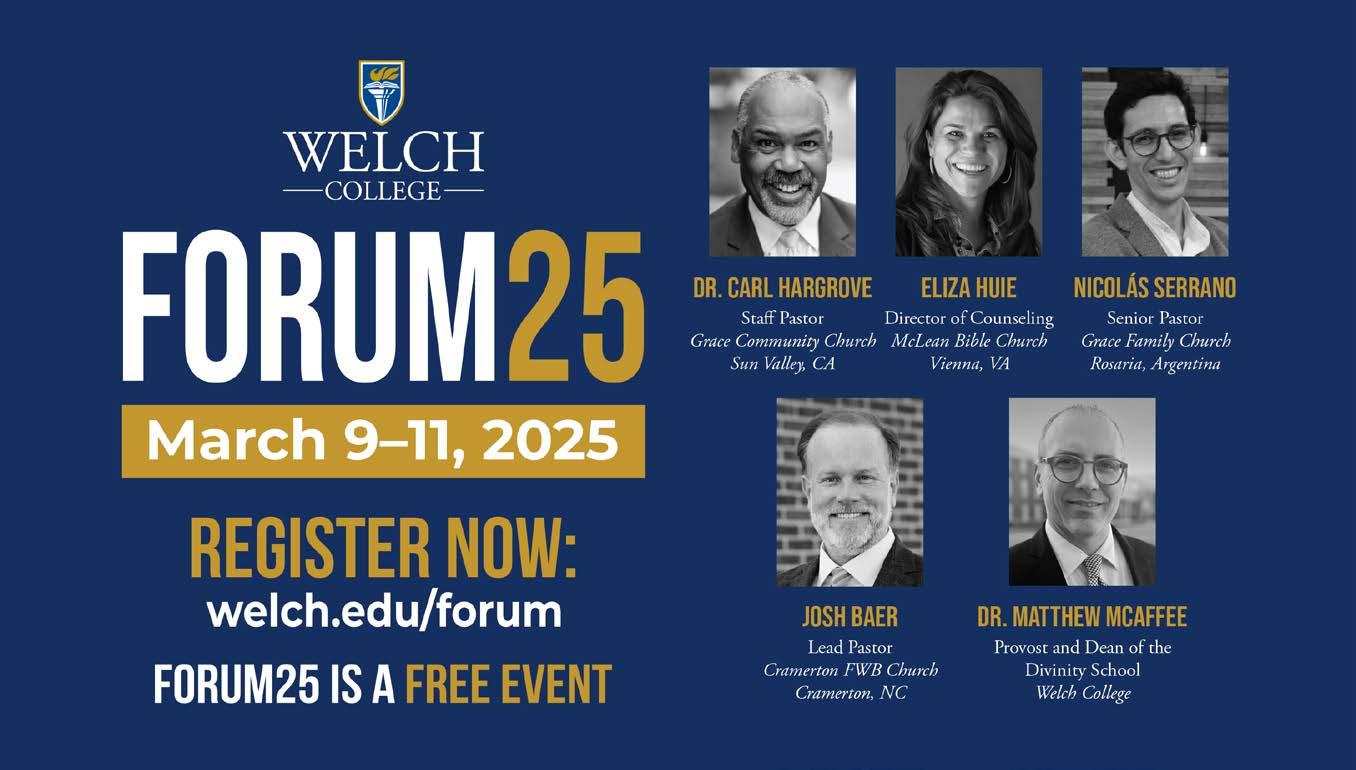

Continued from page 33
Jerry Pinkerton, former missionary to Ivory Coast, died October 20, 2024, after a time of illness. Appointed as missionaries to Côte d’Ivoire in 1971, Jerry and his wife Carol retired after 38 years of service. Wherever they were needed, they went — often tackling assignments outside their comfort zone. Jerry preached in villages, and he and Carol served as dorm parents to high school boys. He taught at the Bible institute in Bouna, built up faltering churches, and maintained equipment and buildings in Doropo, allowing medical personnel to focus on their craft.
Pinkerton shared the gospel with anyone who would listen — even gun-brandishing car hijackers. He discipled believers and trained leaders. Their last ten years were
spent in Abidjan, even though they loved the bush country. Working with another missionary couple and Ivorian leaders, they planted three churches in the metropolis. They saw Ivorian pastors installed, and the churches become fully autonomous and ready to multiply.
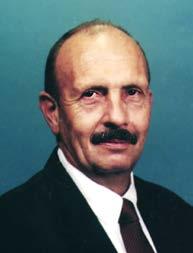
Upon their retirement, Jerry pastored in Mountain Grove, Missouri, and served as a WMO ambassador for several years. When Jerry’s health declined, the couple moved to Arizona to live with son Jerry, Jr. and his family, where they remained until Jerry entered his eternal home.
BY BARRY RAPER
One Sunday morning, a cowboy entered a church just as the service began. It was an upscale church, with people dressed to the nines. The cowboy had on his best jeans and a clean shirt. His cowboy hat and the Bible in hand were both worn.
When the cowboy took a seat, it was obvious he was unwelcome. People moved away, appalled by his appearance. After church, the preacher approached him and asked him for a favor: “Before you come back to church here again, ask God what He thinks would be appropriate attire for worship.” The cowboy told the preacher he would be sure to do that.
The following Sunday morning he returned, wearing the same clothes. Again, people shunned him. After church, the preacher approached the cowboy and said, “I thought I asked you to speak to God before you came back to our church.”
The cowboy replied, “I did.”
Taken aback, the preacher asked, “Well, if you spoke to God, what did He say you should wear to worship here?”
“Well, sir,” said the cowboy, “God told me He didn’t have a clue, that He had never been in this church.”
This fictional (and biting) story illustrates a danger for churches. One of the most dangerous situations in the church is when requirements and expectations are placed on people that God Himself doesn’t require or expect. This was the situation in the church at Corinth, at least with one individual. The church acted as though his sincere repentance wasn’t enough, that he was unworthy to return to their fellowship.
When sinners repent, God forgives, and that forgiveness also should be extended by the church. However, at Corinth, repentance was not enough. From this passage, consider three simple steps to avoid making the same mistake.
Emphasize repentance. Scripture is clear: a person must repent to follow Christ. Repentance stems from a changed
mind that leads to changed behavior. Another way to describe repentance is turning away from something, and in terms of Christianity, making an about-face from sin and self to God (in faith).
Repentance and faith are inseparable, two sides of the same coin. You must repent and exercise faith to become a Christian. However, we do not leave repentance behind when we become believers. Repentance continues for life.
We are not sure of the identity of this nameless individual Paul described. However, it seems logical Paul might have been referring to the man identified in 1 Corinthians 5 who was a professing Christian living in unrepentant sexual immorality. His behavior became a scandal in the church. Paul challenged the church to exercise discipline and put this individual out of their fellowship — not because he was a sinner, but because he was a professing brother whose lifestyle indicated otherwise.
Whether this is the same man described in 2 Corinthians 2 ultimately doesn’t matter. The point is the church had inflicted discipline, and according to verse 6, the punishment had been sufficient. The individual repented, and no further punishment was needed. The church made the difficult decision (verse 6) to do something to help a fellow believer see his need for repentance, and their actions led to repentance. Emphasizing the need for repentance led to repentance.
Embrace restoration. Though this individual had repented, the Corinthian congregation continued to keep him at arm’s length. Rather than welcoming him back into fellowship, they gave him “the cold shoulder.” Perhaps they held his sin over his head. Maybe they approached him with cynicism, suspicion, and scorn. In verses 7-8, Paul urged the Corinthians to forgive him, comfort him, and confirm their love toward him.
• Forgive. Forgiveness means we stop bringing failures up. While we may be unable to forget what took place, we choose to leave failures in the past and under the blood of Christ.
We do not leave repentance behind when we become believers. Repentance continues for life.
• Comfort. The Greek word translated comfort in verse 7 is the same word used many times in 2 Corinthians to describe the Holy Spirit, the Great Comforter. Here, Paul reminded the Corinthians that while God is the source of all comfort, He uses His people to extend that comfort.
• Confirm. The word used in verse 8 means to validate or confirm something publicly. Of course, individuals in the church needed to express their love privately, but it is possible Paul was calling for public, corporate affirmation of fellowship. Verse 10 makes it clear forgiveness is between the individual and the Lord. However, Paul also made it clear God expects us to forgive others. The basis of our forgiveness — and our motivation to forgive — is found in the person of Jesus (verse 10). We follow His example in restoration.
Galatians 6:1-2 reminds us, “Brethren, if a man be overtaken in a fault, ye which are spiritual, restore such an one in the spirit of meekness; considering thyself, lest thou also be tempted. Bear ye one another's burdens, and so fulfil the law of Christ.”
The word restore is sometimes used to describe setting a broken bone or mending a net. It communicates the idea of not only mending the broken but returning it to its original purpose. Repentant sinners need restoration so they can start living productive lives for God once again.
Does this mean a fallen individual will be restored to the same positions within the church? Not always. Sin carries consequences, sometimes practical consequences. For example, if a man has sinned by habitual repetitive anger (or even violence) toward his children, though genuinely repentant to his children, wife, and Lord, it still may not be in his best interest (or the best interest of the church) to allow that man to work with children on Wednesday nights.
Beyond practical consequences, however, restoration does mean renewed fellowship. Paul provided two important reasons for the church to restore the repentant: first, to keep him from being overwhelmed by excessive sorrow. Second, lack of restoration can give Satan an advantage in
the church. Paul made it clear failure to forgive this transgressor would be succumbing to the schemes of Satan. The devil has many devices. One is to hold past sins over people as the “accuser of the brethren.” Let’s not take up the same occupation. Where there is genuine repentance, may we also offer genuine forgiveness as a congregation.
How did the church at Corinth respond? While we hope they took Paul’s command to heart and welcomed the brother back, we simply don’t know. We don’t have a third epistle to the Corinthians. Yet, if the Corinthians did what was right, they forgave the man, comforted him, and confirmed their love toward him. Regardless of the sin, when there is true repentance, genuine forgiveness should follow.
Do you find it hard to forgive? Maybe it seems impossible to forgive and comfort someone who strayed in some horrific way, or who hurt you personally but later repented. Maybe you think it is your job to remind them of past mistakes by your attitude and spirit.
If so, take a moment to recall the familiar parable of the prodigal in the Gospel of Luke. The younger son asked for his inheritance, left home, and squandered the money through an immoral, unrestrained lifestyle. However, when he reached the end of the money and the end of himself, he made the decision to return home. A beautiful story of repentance and restoration follows — a picture of how God seeks and saves the lost. The father in the story ran to his son, hugged him, kissed him, and threw a party to celebrate his return.
But the older son would have none of it.
This older son represents the Pharisees in the crowd listening to Jesus tell the parable. They refused to rejoice over the repentance of people they deemed unworthy: prostitutes, publicans, and other outcasts. I pray this older son does not represent us! Sadly, sometimes the cruelest people in the world are those who think they hold the religious “high ground.”
Do you refuse to forgive those who have been forgiven by God? Jesus is not a friend of sin, but He is a Friend of sinners. How can we be anything less? Repentance is enough.
Columnist: Dr.
“He that observeth the wind shall not sow; and he that regardeth the clouds shall not reap” (Ecclesiastes 11:4).
BY EDDIE MOODY

Recent data regarding Free Will Baptists and other denominations has prompted many conversations. However, data that does not lead to action is not useful. This article will report the data and offer ways we can use that data to help our denomination be more effective.
Where did the data originate? Most of this data is found in the Cooperative Election Study (CES), which began in 2006. The CES is used to survey over 50,000 Americans every two years. Study participants identified themselves from a dropdown menu of religious denominations and traditions. You can access the data set on the Harvard University website. Until statistician Ryan Burge began examining this data for information regarding religious groups, it was primarily used by political scientists to study elections.1
The second set of data is from the United States Religion Census, which dates to 1906. The NAFWB provides the Religion Census with data every ten years.2 The data set provided is derived from yearly reports that churches, associations, and states submit to the NAFWB. The Religion Census analyzes the data in conjunction with the United States Census.
What does the data indicate? The data provides important information about the educational, family structure, and financial condition of Free Will Baptists as well as information on the location of NAFWB churches. Much of the data was reported recently by Ryan Burge in his article “The Socioeconomic Status of American Religion Traditions” where he examined the top 20 denominations in America.3
1 https://cces.gov.harvard.edu
2 https://www.usreligioncensus.org
3 Burge, R. (2024). The Socioeconimic States of American Religious Traditions Graphs About Religion. Accessed: https://www.graphsaboutreligion.com/p/the-socioeconomic-statusof-american?r=1btmz6&utm_campaign=post&utm_medium=web
Of the 20 largest Protestant denominations, CES results indicate that people who identified themselves as part of a Free Will Baptist congregation reflect the lowest number of congregants with a college degree (Figure 1, below). Burge also compared the increase in the college-educated population from the 2008-2010 administration to the 2022-2023 administration of the CES (Figure 2, next page). Results indicated that Free Will Baptists who earned college degrees only grew by 3%. By comparison, during the same period, overall college degree recipients in America grew by 9%. The findings are consistent
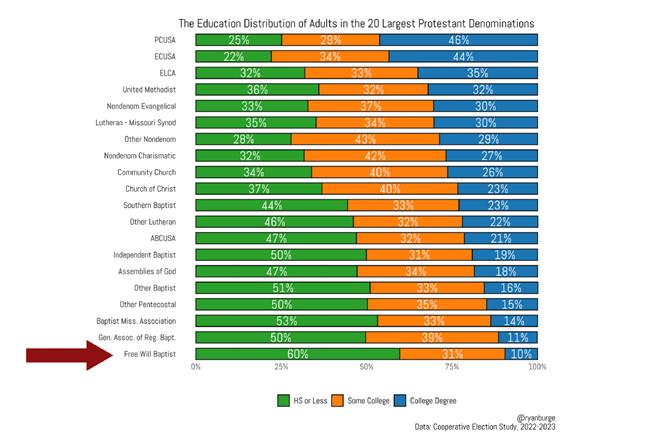

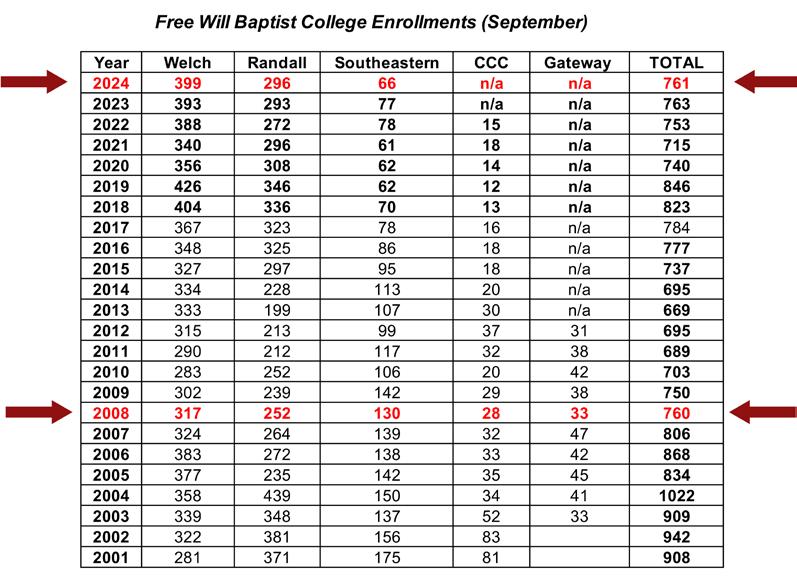
with data the NAFWB collects about enrollment in our colleges (Figure 3).
In 2024, only 761 students enrolled at our three colleges. In 2022, Free Will Baptist churches reported a membership of 101,353. Free Will Baptists are likely undercounted since seven states or districts reported no members. The low attendance at Free Will Baptist colleges is likely related to a low overall college attendance by Free Will Baptists.
Why might the educational level be so low? One hypothesis could be tied to the locations of most Free Will Baptist churches. Data
from the Religion Census indicates that many NAFWB churches are located in rural communities (Figure 4, below). Twenty-eight percent of NAFWB churches are located where only 5% of the U.S. population resides. Put another way, the map (Figure 5, opposite) from the Religion Census depicts the U.S. counties where NAFWB congregants are a large percentage of the population.
Compare the map in Figure 5 with the map (Figure 6, opposite) depicting the counties where the largest percentage of the U.S. population has earned a college degree.4 Free Will Baptists might have a lower percentage of college-educated congregants because they reside in communities with a lower percentage of residents who have earned college degrees.
What are the implications? A strong correlation can be drawn between educational attainment and income
4 https://en.wikipedia.org/wiki/ Educational_attainment_in_the_United_ States#/media/File:US_bachelor’s_ degree_by_county_in_the_United_States. png
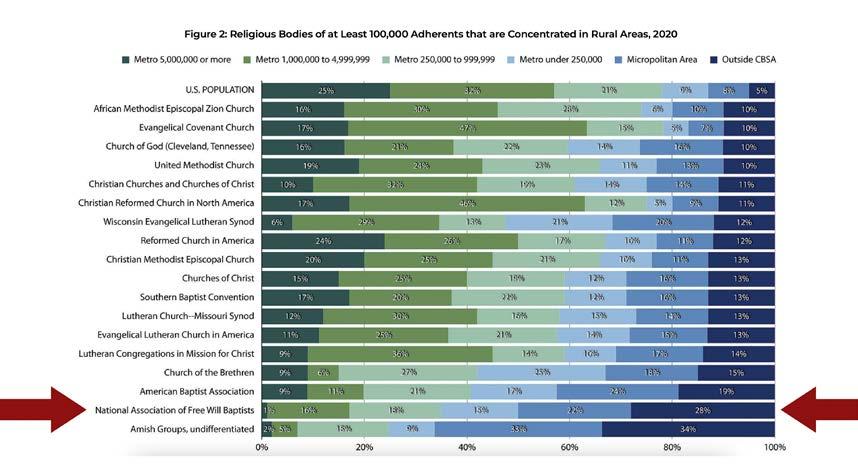
earned.5 That appears to be the case with Free Will Baptists. When comparing Free Will Baptists to other religious traditions in America, Free Will Baptists have the lowest average household income based on CES data (Figure 7, page 50). The correlation between education and income can be found in the scatterplot graphed by Ryan Burge (Figure 8, page 50).
These results indicate Free Will Baptists have a greater number of challenges than other groups. Ryan Burge put it this way: “Southern Baptists have statistically the same income as the average American, but the same can’t be said for Free Will Baptists. They are clearly the most economically disadvantaged.”
This has implications for giving. In 2023, $17,372,228 was given to national ministries. Although that was an increase of nearly a million dollars from 2022, 76% of all giving was to missions. By comparison, a single anonymous donor gave $15 million in one day to Cedarville University. The gift was part of a larger campaign of $175 million. Free Will Baptists have greater economic challenges than other religious bodies.
Many will argue with these CES findings. I think discussing them too much is akin to “observing the wind.”
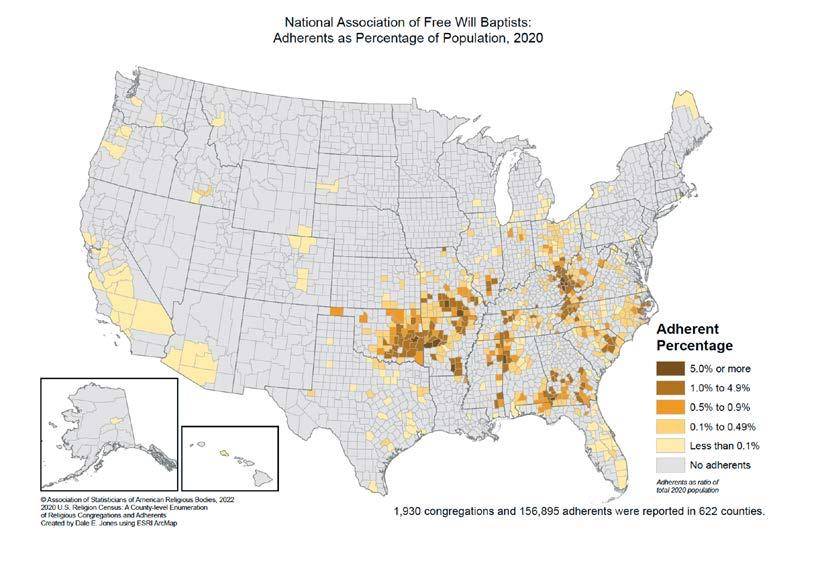
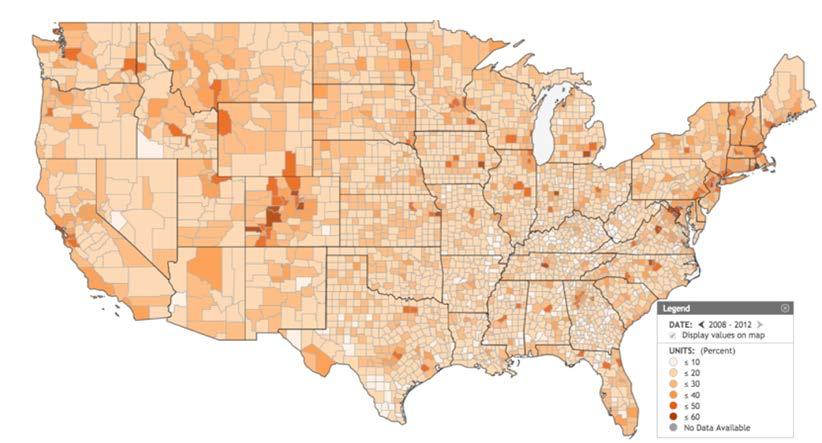
Even if someone disagrees with the findings, hopefully we can agree on some actions needed to have a healthier denomination. Compare this to an annual physical where a doctor warns the patient he has some health issues and needs to exercise more and lose weight. Perhaps the patient disagrees with the assessment. Regardless, if he exercises a bit more and engages in a healthier diet, he will have a better outcome. Rather than arguing about the assessment, let us agree on some action steps and reap the benefits.
5 Zhang, L., Liu, X., & Hu, Y. (2024). Degrees of return: Estimating internal rates of return for college majors using quantile regression. American Educational Research Journal. Prepublished March 12, 2024: https://doi.org/10.3102/00028312241231512
Free Will Baptists are also among the youngest [denominations]. This obviously has a tremendous impact on whether a congregation fills up its nursery every Sunday during worship. — Ryan Burge
Although Free Will Baptists may be economically disadvantaged, CES data indicates we are the third youngest denomination in America. More than one measure points to this finding, but the best indicator is the percentage of parents or guardians with a child under age 18 (Figure 9, page 51). Many Free
Will Baptists lack resources, but the number of young people provides great opportunities for the future that other denominations do not have. We can turn the education and economic trends around for the next generation.
How? “A bishop then must be...apt to teach” (1 Timothy 3:2).
Encourage presbytery boards to assess whether candidates can teach. Our congregations need good teaching. To achieve this, we must assess whether pastoral candidates meet the qualifications of “apt to teach.”
We encourage presbytery board members and others to take pastoral candidates under their wings and read and discuss books together. The D6 reading list for pastoral candidates is a good place to start (https://rhpweb.s3.amazonaws.com/ReadingList-Ordination.pdf). This process is good for candidates as well as presbytery board members who are also likely to become familiar with many of these resources.
Encourage ministry candidates to attend our colleges. Too often, we lose pastoral candidates to other movements. Perhaps there have been cases where a pastoral candidate encounters challenging teaching for the first time in a Calvinistic college. This could lead one to assume Calvinism has more substance than Arminianism. For this reason, we encourage ministry candidates to attend our colleges, especially until they are fully grounded in doctrine. When students do not attend our colleges, we encourage pastors to walk alongside the candidates and increase their mentoring efforts during this critical period.
Make continuing education the expectation. In professional fields, continuing education is required so professionals stay fresh and never stop learning. Continuing education takes place at conferences and webinars, and by reading books followed by tests. For us, this can take place via attendance at the National Convention seminars, D6 Conferences, FORUM and Forlines Lectures at Welch College, Leadership Conference, boot camps, the Theological Symposium, and associational meetings, as well as through podcasts and webinars. Active learners are attracted to other active learners, so it is critical to be lifelong learners, both for us personally and for our congregants.
Encourage the pursuit of higher learning and training opportunities. Many question the value of college these days. However, for our students (many from economically disadvantaged backgrounds), college and other training opportunities are critical for social mobility.
Consider the most recent U.S. News and World Report’s Best
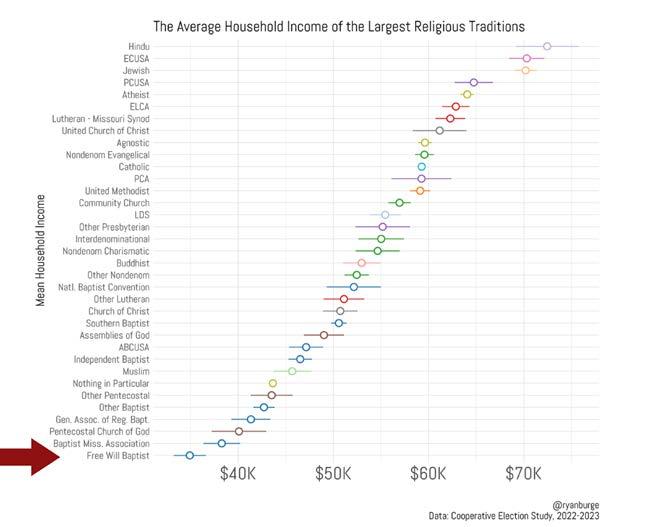
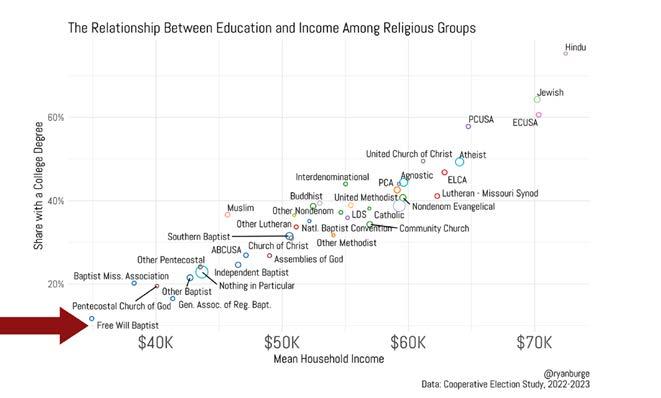
Colleges report. Welch College was ranked first in social mobility for “Best Regional Colleges-South.” The social mobility measure is based on the percentage of students from economically disadvantaged backgrounds who go on to graduate. This is an example of how Welch College changes the life trajectory of economically disadvantaged students. Additionally, Welch ranked fifth lowest among private colleges in student debt after graduation.6 This is an important point when encouraging our students to attend our colleges.
When our students attend other Christian colleges or secular colleges, we encourage pastors, parents, and mentors to help
6 https://welch.edu/welch-college-ranked-1st-in-social-mobility-2025
them find a Free Will Baptist church near their school while also regularly checking in with them regarding progress. In economically disadvantaged communities, if these students return, there will be additional opportunities to lead and influence the community.
Encourage churches to use D6 Curriculum. Good curriculum is critical to learning. Every teacher is prone to drift into favorite topics when teaching. One way to counter that trend is to teach using curriculum. Curriculum requires a teacher to learn and teach both familiar and unfamiliar topics, and often teachers are challenged to use new techniques, providing an opportunity to acquire new skills.
Curriculum is also good for students. Students know what is coming, and they can be prepared and continue study throughout the week (a requirement in other educational settings). D6 curriculum follows this format, providing unified lessons across age levels and promoting further study outside the church setting. Incidentally, students who study D6 Curriculum will be better prepared for college-level learning, and college-educated students will likely be attracted to D6 Curriculum.
Encourage everyone to participate in learning opportunities. A learning laity is a better equipped laity. Encourage laypeople to attend the National Convention (which offered more than 90 seminars last year), the Leadership Conference, and associational meetings, taking advantage of every learning opportunity. Also, consider regional Bible institutes, a class from one of our colleges, or a NAM Boot Camp on the Road. In my experience with boot camps, our laity are like sponges
soaking up knowledge. Additionally, if you know someone interested in earning an online Church Answers Certificate (e.g., worship, women’s ministry), have them email questions@ nafwb.org for the Free Will Baptist discount.
Encourage churches without pastors to be actively learning. Learning should not stop when a church is without a pastor. Encourage churches to utilize online resources for The Shepherding Initiative. Video-based messages, Bible studies, and coaching are available to keep learning active when a church is without a pastor.
Teach financial literacy. Many communities where our churches are located lack financial literacy. Consider including a session on finances in premarital counseling and use a marriage mentor who will work with couples in the areas of debt, retirement, saving, and budgeting. Congregants do not have to be employed in the ministry to utilize Richland Ave Financial resources, so we encourage you to point them toward their podcasts and other materials.
Implement the resources Free Will Baptist Foundation offers for estate planning. Consider teaching Art Rainer’s Eight Money Milestones or Dave Ramsey’s The Total Money Makeover to help those in your congregation and community be good stewards of their resources.
Consider hiring a staff member from Church Answers to coach your church in the areas of stewardship and financial counseling for those struggling. If we help our people increase their financial stability, this will not only benefit them personally but will also increase the financial viability of our churches and lead to more resources for Kingdom work.
Lastly, look into the MINCE activities we have promoted to help your church develop a firm financial foundation (see nafwb.org/MINCE).
Yes, Free Will Baptists have many challenges, but our future is bright if we continue to methodically obey the Lord and teach our people so more people will see the light of the gospel.
In an era where many denominations are known for their controversies and in-fighting, here is a story of a denomination that quietly and methodically demonstrates obedience to the gospel in a positive light for the world to see. — Thom Rainer, describing the National Association of Free Will Baptists.

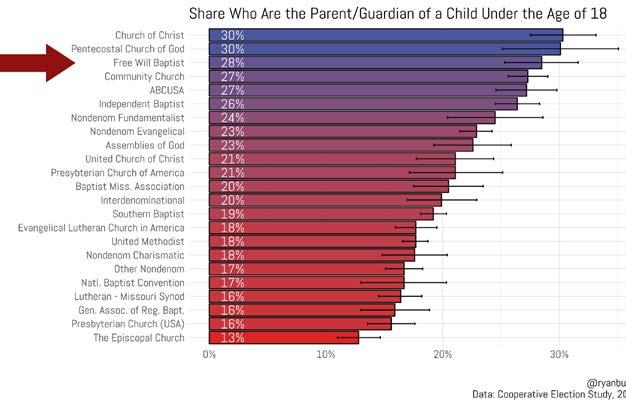
About the Writer: Eddie Moody is the executive director of the National Association of Free Will Baptists. For additional resources, visit www.nafwb.org.
BY DEREK ALTOM
I love how the Apostle Paul began several of his letters to churches in the New Testament. Paul said something like this (my paraphrase): “When God brings you to my mind, I cannot help but thank the Lord for you. I immediately stop what I am doing and say a prayer of thanks for you.” Paul offered these prayers of thanks for a variety of reasons.
At D6 Family Ministry, we relate to Paul’s words. We often stop what we are doing to thank God when certain groups or individuals come to our mind. Let me offer an example. Recently, a local pastor shared a story that reminded me how thankful we are for D6 Heroes. The pastor’s church was struggling and on the brink of making difficult decisions.
One of the many things plaguing the struggling church was a lack of focus and attention to discipleship strategy. The congregation desperately needed help but lacked the funds to purchase needed resources. In a moment of vulnerability and transparency, the church reached out to D6 Family Ministry to see if we could help.
One of the many ways D6 Family Ministry assists churches is by providing discipleship curriculum at a discounted rate until the church regains financial stability. This type of
service is only possible because of faithful financial contributions from individuals and churches. We call these financial partners D6 Heroes.
Heroic acts of generosity help hurting churches receive assistance from D6 Family Ministry during moments of need.
Thanks to D6 Heroes, this congregation regained hope in the future of their ministry. Thanks to D6 Heroes, men and women grew in their understanding of the Scriptures and grew in their relationships with the Lord as they studied the Word of God together each week. Thanks to D6 Heroes, families were equipped by this local church to take discipleship home as families sought to pass their faith to the next generation. In short, this church was impacted, and lives were changed. They received the discipleship resources they desperately needed for ministry at a significant discount because of D6 Heroes.
Little by little, the church began to grow — spiritually, numerically, financially. Eventually, they no longer needed financial assistance and began paying full price for their discipleship
materials. Fast forward a few years, and the church began doing something else. Now on stable footing, the congregants decided they wanted to do something to give back, to help other churches in the situation they once faced. So, they became D6 Heroes. They began partnering with our ministry financially, making it possible for struggling churches to receive assistance from D6 Family Ministry. They are now “paying it forward” to help other churches.
When I hear stories like this, I cannot help but pause and thank God for the financial sacrifices being made by individuals and churches. Heroic acts of generosity help hurting churches receive assistance from D6 Family Ministry during moments of need. Whether a significant one-time annual gift or recurring monthly gifts, these heroes support other ministries and invest in their discipleship efforts.
I like to think if the Apostle Paul were writing a letter to these D6 Heroes, he would begin the letter by saying, “I thank God for you!” Thank God for D6 Heroes.
About the Writer: Derek Altom is the director of events and development for D6 Family Ministry. Derek can be reached at derek.altom@ d6family.com.
BY RON HUNTER JR., PH.D.
A few issues ago, many of you responded favorably to the “Six Thinking Hats” column, which introduced a fresh way to approach ideas. I want to share another powerful tool for evaluating changes in services, products, or writing.
SCAMPER was developed by Bob Eberle in the 1970s using ideas from Alex Osborn, the advertising executive who popularized brainstorming, the structured method to enhance creativity.
SCAMPER offers very specific ways to think differently about anything you are exploring:
S — Substitute. Think about replacing part of the product, process, or idea. Example: “What materials or components could be swapped out for something else?”
C — Combine. Look for ways to merge or combine elements for new results. Example: “How could different features work together?”
A — Adapt. Adjust or modify the product or process to serve a different purpose. Example: “How could this concept be used in a new or unexpected way?”
M — Modify. Change attributes — shape, color, size, etc. — to alter and affect outcomes. Example: “What happens if we make it bigger, smaller, or more colorful?”
P — Put to another use. Consider how to repurpose the product or idea. Example: “Is there another way this could solve a different problem?”
E — Eliminate. Remove elements to simplify or streamline. Example: “What would happen if we took something away?”
R — Reverse. Flip the order, direction, or roles for new perspectives. Example: “How would this work if we did the opposite?”
SCAMPER is flexible; you don’t need to use every question or letter. In fact, I’ve only used the full method once in years of practice. Instead, focus on one or two letters that address a specific challenge. For instance, substituting, modifying, or combining often sparks fresh ideas and leads to further enhancements. Have fun exploring with SCAMPER.
About the Columnist: Ron Hunter Jr. has a Ph.D. in leadership and is CEO of D6 Family Ministry. You may contact him at ron.hunter@ d6family.com.




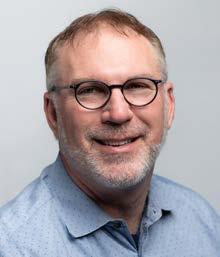
Nashville, TN — Ron Hunter Jr., Ph.D. has been elected for an unprecedented second term as an officer of the Protestant Church-owned Publishers Association (PCPA), an organization of 30 denominational publishers and 12 affiliate members in printing and vendor services.
After the departure of the acting president and vice president, Dr. Hunter was invited to return as vice president to provide stability and guidance. He previously served
as vice president (2014-2016) and as president (2016-2018). Positions are elected by and from peer CEOs gathered from all denominational publishers.
“The current climate calls for someone of Ron’s experience and leadership, and re-electing him will allow him to serve two years as vice president before returning to the role of the president, giving him four years to help lead the organization,” stated PCPA Executive Director Beth Lewis.
The roles are voluntary and include leading the annual meeting of CEOs at the spring conference featuring industry trends and training.
• D6 Family Ministry won eight printing and design awards from Printing Industry Association of the South (PIAS), including two best-in-category recognitions, and six Evangelical Press Association awards for excellence in content and design.
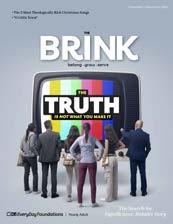

• All Randall House New Testament Commentaries are now available on Logos Bible software, bringing our tally on the digital platform to 32 titles.
• D6 Family Ministry launched two new conferences in 2024: D6 Northwest in Seattle, Washington, and D6 Thailand. With six physical conferences each year and one online (D6 Asia), we now connect with leaders from 19 countries and nearly 2,000 churches — a significant global impact for less than $20,000 annually.
• D6 HomePoint, our biggest acquisition of 2024, offers families resources like topical checkups, devotionals, and books to address real-life pain points.
• The D6 Podcast celebrated eight years of sharing leading voices in family ministry and church leadership.
• D6 Hero donors increased by 84% this year. Donations support military chaplains and church plants with free and discounted resources, international discipleship and book translation projects, youth training and leadership programs, and more.
Every accomplishment is a testament to God’s provision and your unwavering support. We’re equipping families and churches worldwide to make disciples and transform generations.
Nashville, TN — A license has been issued to translate A Biblical Theology of Youth Ministry into two dialects of Bahasa (Malay and Indonesian), according to Ron Hunter, CEO of D6 Family Ministry. The new translation will bring the tally of D6 Family Ministry titles to 80 translations of 35 unique titles into 20 languages.
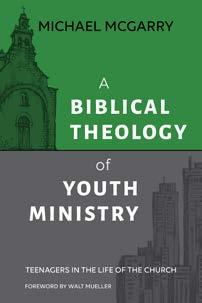
JULY 20 - 23, 2025 •

The Mystery of the Ordinary: 8 Statements Your Kids Need to Hear... and Why! by
Linc Taylor
Every parent should communicate these essential statements to their children for their emotional and spiritual well-being. This book offers a blueprint for building a family legacy grounded in love, belonging, and faith.






by Dave Rahn and Ebonie Davis
Grit & Joy provides strategies for parents and mentors to help teens build lasting, authentic joy and guide them toward a deeper, more meaningful faith—one that will carry them through life's challenges and help them thrive.
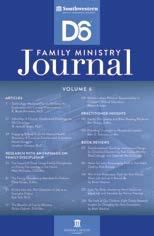
The Southwestern D6 Family Ministry Journal: Volume 7
Managing Editor
Jonathan Williams
The Southwestern D6 Family Ministry Journal Volume 7 seamlessly combines scholarly research and practical application to equip families and ministry leaders for generational discipleship. Rooted in Deuteronomy 6:5-7 and other biblical texts, this journal serves as a vital resource for professors, researchers, and students dedicated to developing Christian leaders.

Antioch, TN — The 2024-25 Nominating Committee has presented the following nominees to be considered for the 2025 National Convention election, according to Jimmy Lawson (MI), committee chair. The following boards do not elect members in 2025: D6 Family Ministry; IM, Inc; Welch College; and WNAC.
Note: bios are included only for new board and commission nominees, not for returning members.
Moderator
Tim York (TN)
Assistant Clerk
Ernie Lewis (IL)
FWB Foundation
Brent Patrick (VA)
Matt Mouser (GA)
Corey Minter (TN)
Board of North American Ministries
Josh Bush (KS)
Faron Thebeau (MO)
Bob Brown (FL)
Josh Bush has been the lead pastor at Cross Point FWB Church in Wichita, Kansas, since 2006. A member of the Kansas Executive Board, Josh is the General Board representative for Kansas Free Will Baptists. In addition to being a local police chaplain for 15 years, Josh has served on various boards of ministries and non-profits in Wichita. He is active in mentoring and training younger leaders in pastoral ministry. Josh holds a bachelor's degree in ministry and leadership from Randall University.
Faron Thebeau has been a Free Will Baptist pastor for 30 years, including 11 years at Primera Iglesia Bautista Libre, a bilingual church in Weslaco, Texas. For the last six years, he has pastored Mosaic FWB Church in Rolla, Missouri, which has a focus on reaching international college students. A member of the NAFWB College Task Force, Thebeau is the assistant clerk of the Missouri State Association and served two years on the Christian Education Board of the Texas State Association. Thebeau holds a B.S. degree in Christian ministry from Welch College.
Richland Ave Financial
Don Myers (MI)
Lance Boyer (MO)
Steven West (FL)
Steven West began serving as youth pastor at Graceway FWB Church in Melbourne, Florida, in 2014. He transitioned into the role of lead pastor in 2021. Steven holds a bachelor’s degree in Bible from Southeastern Free Will Baptist College.
Media Commission
Isaiah Grimes (VA)
Commission for Theological Integrity
Rodney Holloman (TN)
Jeremy Craft (FL, fulfilling uncompleted term)
Jeremy Craft has pastored in Florida for 11 years and currently serves as pastor of the Piney Grove FWB Church in Chipley. A member of the Executive Committee of the Florida State Association, Jeremy is additionally the clerk of the West Florida Association and a member of the board of directors for Camp Mount Pleasant. Craft is a cofounder and regular contributor to the Helwys Society Forum. He holds a B.S. degree in biblical studies from Welch College and the M.Div. degree from Gordon-Conwell Theological Seminary.
Historical Commission
Eric Thomsen (TN)
Music Commission
Bryan Hughes (NC)
Executive Committee
David Taylor (AR)
Danny Williams (AL)
Josh Colson (IL)
Josh Colson pastors Angelville Community Church in Pittsburg, Illinois. He serves as the General Board representative for Illinois Free Will Baptists as well as assistant clerk of the Illinois State Association and assistant moderator of the South-Central (Illinois) Quarterly Meeting. Josh is both a frequent contributor to the Helwys Society Forum and a past presenter at the Free Will Baptist Theological Symposium. Colson earned a B.S. in theological studies, the M.A. in theology and ministry from Welch College, and the M.T.S. in theological studies from Vanderbilt University.
Submitted by the Nominating Committee: Jimmy Lawson, chair (MI); Clint Adams (GA); Travis Alexander (AR); Lanney Ard (SC); Steven Hood (AZ); and Carol Thompson (OK).
Antioch, TN — December 9-10, 194 Free Will Baptist pastors and ministry leaders from 26 states gathered at Sonesta Nashville Airport for the annual Free Will Baptist Leadership Conference. The two days were filled with fellowship, training, resources, new ideas, and business.
Speakers and panelists tackled the theme, “Flying Solo,” identifying challenges and offering solutions related to isolation in ministry.
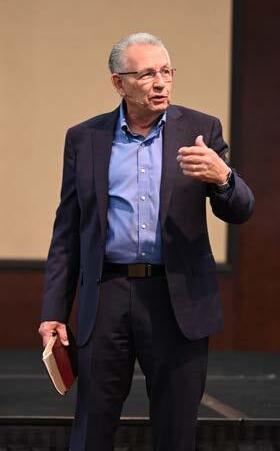
Keynote sessions featured Gary McIntosh, writer, speaker, and professor. The author of 22 books, McIntosh has spent many years as a professor of Christian Ministry and Leadership at Talbot School of Theology, Biola University, teaching pastoral theology and missiology. Gary has analyzed over 1,200 churches from 90-plus denominations in the United States, Canada, Australia, and Southeast Asia. A former pastor himself, Gary understands both the challenges and blessings of the pastorate.
During the Monday evening opening session, McIntosh identified key challenges confronting pastors in isolated ministry and shared simple (though not easy to implement) solutions to overcome these challenges.
Tuesday morning, drawing from the story of Joseph, McIntosh defined “vision” as “a picture of a desirable future.” He reminded pastors that God likely will give them a vision for their church. He offered guidelines for sharing this vision in a way that inspires and excites the congregation. “Vision is important…” he concluded. “We can lead our churches into the future, and I pray that is what happens.”
Tuesday evening, McIntosh emphasized God’s continuing desire for His Church to grow, as evidenced by His command to “go and make disciples” (Acts 1:8). This command
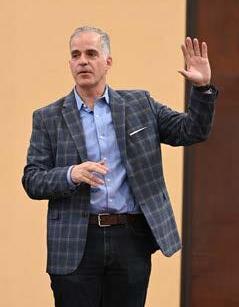
is clear and unmistakable, and it is a mandate, unchanged today. McIntosh concluded by sharing six ways God continues to grow His Church today.
Daryl Crouch, executive director of Everyone’s Wilson, encouraged churches to reach their communities by embracing the power of network. “One church cannot reach the entire community,” he explained. “It takes the united Body of Christ working together.” Crouch also encouraged congregations to establish relationships at every level of the community — beyond the walls of the church — thereby creating trust and building redemptive bridges.
Bestselling author Robert J. Morgan offered encouragement from his book The Mediterranean Sea Rules. From the story of the Apostle Paul’s voyage and shipwreck recorded in Acts 27-28, he urged listeners to let God work His will and way through the storms in their lives. “What is faith?” Morgan asked listeners. “Faith is believing that life will work out exactly as God intends.”
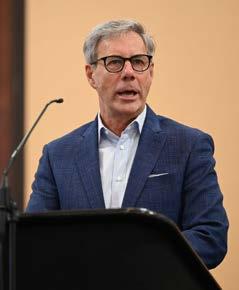
Tuesday afternoon, a seven-person panel moderated by Executive Director Eddie Moody updated the counseling and fellowship
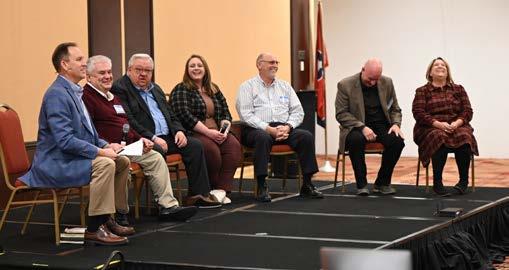
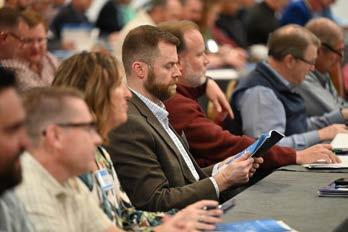
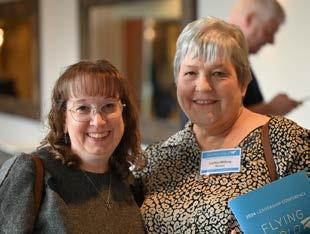
opportunities available to Free Will Baptist ministry families. Moody and the panelists acknowledged the desire to help connect those successfully counseled with others struggling.
Stan Bunch, director of the Missouri State Association, shared the history and purpose of associations within the denomination and then offered practical advice for making associations work at every level by assessing current practices, defining objectives, and implementing those objectives with leadership development in mind.
As always, the Leadership Conference featured far more than sessions and training. Attendees connected or reconnected over banquet-styled meals. Conversations continued long after meals and sessions concluded, spilling over into the hallways and common areas of the hotel. Leaders also took advantage of free publicity photos provided by Rodney Yerby, IM, Inc. board chairman.
Various boards and committees also met in conjunction with the conference, including D6 Family Ministry;
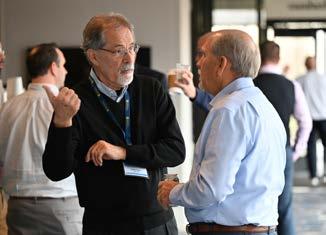
Executive Committee; Free Will Baptist Foundation; IM, Inc.; North American Ministries; Richland Ave Financial; Welch College; WNAC; and state leaders and promotional directors.
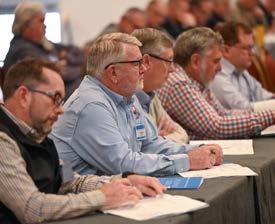
Richland Ave Financial board member Don Myers said: “I’m always thankful for the Leadership Conference. Each year, it renews my long-term friendships and helps me establish new ones. It also fills my mind with long-held truths and introduces new thoughts for today.”
Nashville, TN — Longtime Accounting Administrator
Melody Hood was honored for 46 years of service to the Executive Office during the annual Leadership Conference December 10.
The West Virginia native, who retired January 31, began serving the Executive Office in 1979. She worked for three executive secretaries: Melvin Worthington, Keith Burden, and, currently, Eddie Moody. “Melody has been a faithful part of this office for many years,” Moody noted. “We are deeply grateful for her work and dedication, and we will miss her.”
Coworkers recalled her remarkable cheerfulness, attention to detail, and infectious laugh. “Melody always
Executive Director Eddie Moody announced December 8-9, 2025, as the dates for this year’s meeting. Author and researcher Sam Rainer will be featured as keynote speaker, exploring the theme, “The Neighborhood Church.” Visit nafwb.org/leader throughout the year for updates regarding the 2025 conference. brought a smile to any meeting,” recalled ONE Magazine Editor Eric Thomsen, “not to mention gummy bears, great coffee, and mountains of detailed financial reports. She truly has been a joy to work with.”
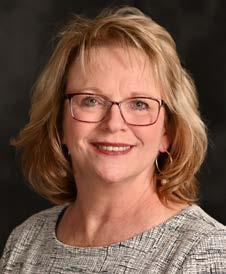
Melody Hood
Attendees at the Leadership Conference gave Hood a lengthy standing ovation after she was honored with flowers and a Pandora™ bracelet featuring charms selected by her coworkers, based on their memories of time spent with Melody.




BY VICTORIA MATLOCK
Kansas City became a significant spot on the still-developing American map in the early 1800s when trappers and traders began settling along the banks of the Missouri River after the Louisiana Purchase. First dubbed Westport Landing, the community later became The Town of Kansas, and finally, in 1889, evolved into Kansas City.
Located directly upon the three primary trails feeding the Western Expansion (Oregon, California, and Santa Fe), the city exploded in population. By the mid-to-late 1800s, Kansas City had become the major railroad hub for those moving goods, cattle, and natural resources between the cities in the East and the growing Western frontier.
By the turn of the 19th century, suburbs were being built beyond the city center, and today, with more than 200 years of history behind it, Kansas City has developed into a large and diverse metropolitan area with a growing economy and unique culture. July 20-23, 2025, Free Will Baptists will once again have an opportunity to make a mark on Kansas City, as the association returns for the 89th National Convention.
Speakers will explore the 2025 convention theme “Accept the Mission.” What is God calling each of us to do? Have we accepted His call, or do we resist His leading? Join us in Kansas City and see how and where God will call you.
The Kansas City Convention Center is conveniently located between the Power and Light District and central downtown. The Kansas City Streetcar offers transportation throughout the city. The free, jump-on, jump-off service spans two miles and stops at 16 popular city destinations.
Hours of Operation:
Monday – Thursday: 6:00 a.m. – Midnight
Friday: 6:00 a.m. – 1:00 a.m.
Saturday: 7:00 a.m. – 1:00 a.m.
Sunday: 7:00 a.m. – Midnight
For more information, visit kcstreetcar.org/route



Sometimes, food is scarce in downtown areas. This is not the case in Kansas City. While Kansas City boasts many wonderful flavors, the city is perhaps best known for its barbecue. This Midwest favorite was introduced in the 1920s by Henry Perry, who began making newspaper-wrapped, slow-cooked pit barbecue. In addition to smoky, savory meat, Kansas City barbecue features a thick, sweet sauce derived from brown sugar, molasses, and tomatoes, and most every restaurant features its own special blend of spices.
Kansas City is proud of its barbecue tradition; the savory development and modifications of the art of barbecue can be traced through the decades. Visitors can enjoy more than a hundred barbecue options throughout the downtown and metro areas.
For those needing a BBQ break (is such a thing possible?) dozens of restaurants of every variety lie within a block of the 16 streetcar stops, so make plans to try local flavors!
Families will enjoy endless activities in greater Kansas City. Swope Park offers a family friendly environment with a zoo, playgrounds, walking and hiking trails, and tennis and basketball courts. The River Market offers a local farmer’s market with over a hundred vendors.
Catch a baseball game at Kauffman Stadium, home of the Kansas City Royals. Visit dozens of museums available: Shoal Creek Living History Museum, National World War I Museum and Memorial, National Airline History Museum, and the National Museum of Toys and Miniatures.
+ Swope Park Zoo and Activities: kansascityzoo.org
+ River Market: kcrivermarket.com
+ Kauffman Stadium: mlb.com/royals/ballpark
+ Shoal Creek Living History Museum: kcparks.org/places
+ National WWI Museum & Memorial: theworldwar.org
+ National Airline History Museum: airlinehistory.org
+ National Toy Museum: toyandminiaturemuseum.org
In 2025, the National Association will pass a milestone as we celebrate 90 years together as a denomination (1935-2025). However, being nine decades old hasn’t kept us from trying something new. This year, the states of Kansas and Missouri are working together to help underwrite the cost of the convention. We offer our thanks to our host churches and leaders. We are excited to spend the week with you! Find more details about next year at nafwb.org/convention


BY EDDIE MOODY
Recently, the directors of the Harvard Study of Adult Development published “The Good Life: Lessons from the World’s Longest Scientific Study of Happiness.” The study concluded real, strong, connected relationships predict the health of our bodies and brains. These findings emphasize what Scripture teaches about “the good life.” It all comes down to fulfilling God’s call.
All are called. When we think about calling, we often think of pastoral ministry or missions. Indeed, I believe people receive a special call to these ministries. But God calls every person to follow and serve Him. He has designed us (Job 10:8; Psalm 139:14-16; Ephesians 2:10) and gifted us (Romans 12:6; 1 Peter 4:10; 1 Corinthians 7:7; 12) to fulfill His mission. Living the good life results when we realize God is working in us (Philippians 2:13) to do His will. As a result, even when bad things happen, we understand God can use it (2 Corinthians 1:4).
Deep down, we know we are called. Sometimes we identify a specific call, like Jonah when he was called to go to Nineveh (Jonah 1:2). When he refused, Jonah certainly did not live the good life (Jonah 2). When we are called to do something and refuse to do it, we experience consequences. On the other hand, we find fulfillment in living out our calling, like Nehemiah, who saw a need and answered God’s

A calling means you can’t sleepwalk through life. We are tempted to “go to sleep” to avoid problems, like Jonah who tried to sleep in the bottom of the ship to get away from God. It didn’t work. Even after God delivered him, Jonah still did not put his heart into going to Nineveh; he only went through the motions. And so, in Jonah 4, Jonah still was not living the good life.
On the other hand, Nehemiah was wide awake as he took steps to fulfill his calling by talking to the king and preparing to rebuild the Jerusalem wall (Nehemiah 2). His life was never the same. Sure, Nehemiah faced many obstacles, but you can sense he was living the good life in Nehemiah 3 when the people came together to rebuild the wall in only 52 days. If you see something needing to be done, it probably means God has called you to that work.
Our call involves people. Current research reveals you can’t have the good life without good relationships. As we represent God to others (2 Corinthians 5:20), their lives improve. Because Nehemiah answered God’s call, the people of Jerusalem had far better lives than they would have had otherwise. When we answer God’s call, people hear the gospel and are discipled in the faith, and churches and families thrive (Ephesians 4:13).
It’s not too late to answer your call (Romans 11:29). Jonah was reluctant to answer the call to Nineveh, but he eventually went. Perhaps he even developed compassion for the Ninevites after God challenged his thinking (Jonah 4:11). If Jonah really was buried in Mosul, Iraq, he returned to Ninevah. (On July 24, 2014, ISIS destroyed Jonah’s tomb.) At the least, the presence of his tomb demonstrates Jonah’s relationship with the people of Nineveh has endured, despite his reluctance to answer God’s call.
Let’s fulfill our call, even if we have stumbled a bit in the past. It’s the only way to enjoy the good life.
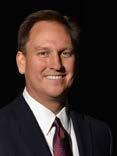
Eddie Moody Executive Director, National
Association of Free Will Baptists

Graduation Celebration
by Steve Greenwood
Graduation Celebration includes engaging activities for parents and children to complete together that help children see how their spiritual growth is just as important as their intellectual and social development.

Guide for Graduates by Jon
Forrest
Guide for Graduates provides a road map to help graduates transition through the challenges and questions of this major milestone. It encourages graduates to pause, celebrate, and prepare for what lies ahead.
It might not sound very romantic, but one of the best gifts you can give your sweetheart this year for Valentine's Day is a well-prepared plan for your future. Since 2013, Free Will Baptist Foundation & Cornerstone Estate Planning have helped thousands of families avoid the legal and financial nightmares of probate court. An estate plan is a gift to be enjoyed long after the flowers have faded.


